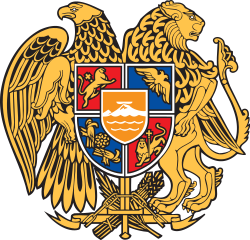Armenian Genocide recognition
Armenian Genocide recognition is the formal acceptance that the systematic massacres and forced deportation of Armenians committed by the Ottoman Empire from 1915 to 1923, during and after the First World War, constituted genocide. The consensus of historians and academic institutions on The Holocaust and genocide studies recognize the Armenian Genocide.[1][2][3][4] However, despite the recognition of the genocidal character of the massacre of Armenians in scholarship as well as in civil society, some governments have been reticent to officially acknowledge the killings as genocide because of political concerns about their relations with the Republic of Turkey, the successor state of the Ottoman Imperial authorities which perpetrated the genocide.[5] The governments of Turkey and its close ally Azerbaijan are the only ones that directly deny the historical factuality of the Armenian Genocide, and both are adamantly opposed to the recognition of the genocide by other nations, threatening economic and diplomatic consequences to recognizers.
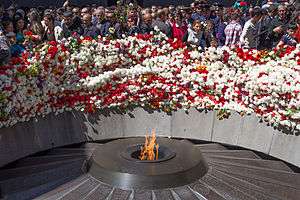
As of 2020, governments and parliaments of 32 countries, including the United States, Germany, France, Italy, Canada, Russia and Brazil have formally recognized the Armenian Genocide.
International organizations
United Nations
The 1948 UN War Crimes Commission Report
On May 15, 1948, the United Nations Economic and Social Council presented a 384 page report prepared by the United Nations War Crimes Commission (UNWCC),[6] set up in London (October 1943) to collect and collate information on war crimes and war criminals.[7] :129 The report was a response to the request by the UN Secretary-General to make arrangements for "the collection and publication of information concerning human rights arising from trials of war criminals, quislings and traitors, and in particular from the Nürnberg and Tokyo Trials." The report had been prepared by members of the Legal Staff of the Commission. The report is highly topical in regard to the Armenian Genocide, not only because it uses the 1915 events as a historic example, but also as a precedent to Articles 6 (c) and 5 (c) of the Nuremberg and Tokyo Charters, and thereby as a precursor to the then newly adopted UN Genocide Convention, differentiating between war crimes and crimes against humanity. By referring to the information collected during WWI and put forward by the 1919 Commission of Responsibilities, the report entitled "Information Concerning Human Rights Arising from Trials of War Criminals" used the Armenian case as a vivid example of crimes committed by a state against its own citizens. The report also noted that while the Paris Peace Treaties with Germany, Austria, Hungary and Bulgaria, did not include any reference to "laws of humanity", instead basing the charges on violations of "laws and customs of war", the Sèvres Peace Treaty with Turkey did so. In addition according to Armenian-Swedish historian Avedian Vahagn, Articles 226-228 also did, concerning customs of war (corresponding to Articles 228-230 of the Treaty of Versailles), the Sèvres Treaty also contained an additional Article 230, obviously in compliance with the Allied ultimatum of May 24, 1915 in regard to "crimes [committed] against humanity and civilization".[7] :130
The 1985 UN Genocide Report, the "Whitaker Report"
In 1985, the United Nations Sub-Commission on Prevention of Discrimination and Protection of Minorities received a report from Special Rapporteur and Sub-Commission member Benjamin Whitaker (United Kingdom) entitled Revised and Updated Report on the Question of the Prevention and Punishment of the Crime of Genocide (commonly known as The Whitaker Report), in which the systematic Ottoman massacre of Armenians during World War I was cited as meeting the criteria for the UN definition of genocide and as one of the genocides of the 20th century.[8] His report was received and noted by a resolution at the 38th session of the Sub-Commission in 1985.[9]
Catholic Church
In 2015, Pope Francis said that the Armenian Genocide was "considered the first genocide of the 20th century". The word was not used again, due to strong Turkish backlash, until June 2016, when he reaffirmed and solidified his stance on it constituting a genocide and strongly condemned the enduring denial of it.[10] Turkey responded by accusing the Pope of having a "crusader mentality" against the country. The Vatican strongly denied this, claiming that the Pope had actually called for reconciliation between Armenians and Turks.[11]
International Association of Genocide Scholars
In 1997 the International Association of Genocide Scholars (IAGS) passed a resolution unanimously recognizing the Ottoman massacres of Armenians as genocide:[12][13]
That this assembly of the Association of Genocide Scholars in its conference held in Montreal, June 11–13, 1997, reaffirms that the mass murder of over a million Armenians in Turkey in 1915 is a case of genocide which conforms to the statutes of the United Nations Convention on the Prevention and Punishment of Genocide. It further condemns the denial of the Armenian Genocide by the Turkish government and its official and unofficial agents and supporters.
— Among the prominent scholars who supported the resolution were: Roger W. Smith (College of William & Mary; President of AGS); Israel Charny (Hebrew University, Jerusalem); Helen Fein (Past President AGS); Frank Chalk (Concordia University, Montreal); Ben Kiernan (Yale University); Anthony Oberschall (University of North Carolina, Chapel Hill); Mark Levene (Warwick University, UK); Rhoda Howard (McMaster University, Canada), Michael Freeman (Essex University, UK), Gunnar Heinsohn (Bremen University, Germany)
The IAGS recognized the 1915 genocide in three different resolutions, on October 5, 2007 extending the recognition to also include the Assyrian genocide and the Greek genocide among the affected minorities:[14]
WHEREAS the denial of genocide is widely recognised as the final stage of genocide, enshrining impunity for the perpetrators of genocide, and demonstrably paving the way for future genocides;
WHEREAS the Ottoman genocide against minority populations during and following the First World War is usually depicted as a genocide against Armenians alone, with little recognition of the qualitatively similar genocides against other Christian minorities of the Ottoman Empire;
BE IT RESOLVED that it is the conviction of the International Association of Genocide Scholars that the Ottoman campaign against Christian minorities of the Empire between 1914 and 1923 constituted a genocide against Armenians, Assyrians, and Pontian and Anatolian Greeks.
BE IT FURTHER RESOLVED that the Association calls upon the government of Turkey to acknowledge the genocides against these populations, to issue a formal apology, and to take prompt and meaningful steps toward restitution.[15]
The IAGS has consistently identified the Ottoman massacres of Armenians as genocide. For example, on March 7, 2009, in an open letter to President Obama, Gregory Stanton, President IAGS stated "we urge you to 'refer to the mass slaughter of Armenians as genocide in your commemorative statement,' as you urged President George W. Bush to do in a letter dated March 18, 2005".[16]
International Center for Transitional Justice
In February 2002, an independent legal opinion commissioned by the International Center for Transitional Justice concluded that the Ottoman massacre of Armenians in 1915–1918 "include[d] all of the elements of the crime of genocide as defined in the [Genocide] Convention, and legal scholars as well as historians, politicians, journalists and other people would be justified in continuing to so describe them".[17] From page 2 of the report:
This memorandum was drafted by independent legal counsel based on a request made to the International Center for Transitional Justice ("ICTJ"), on the basis of the Memorandum of Understanding ("MoU") entered into by the Turkish Armenian Reconciliation Commission ("TARC") on July 12, 2002 and presentations by members of TARC on September 10, 2002.
From page 18, D. Conclusion:
… Because the other three elements identified above have been definitively established, the Events, viewed collectively, can thus be said to include all of the elements of the crime of genocide as defined in the Convention, and legal scholars as well as historians, politicians, journalists and other people would be justified in continuing to so describe them.
In 2007, the Elie Wiesel Foundation for Humanity wrote a letter[18] signed by 53 Nobel Laureates re-affirming the Genocide Scholars' conclusion that the 1915 killings of Armenians constituted genocide.[19] Wiesel's organization also asserted that Turkish acknowledgement of the Armenian Genocide would create no legal "basis for reparations or territorial claims", anticipating Turkish anxieties that it could prompt financial or territorial claims.[20]
European Parliament
On April 15, 2015, the European Parliament backed a motion that calls the massacre a century ago of up to 1.5 million Armenians by Ottoman Turkish forces a genocide,[21] days after Pope Francis' message triggered an angry reaction in Turkey for using the same term.[22] It had previously done so in 1987,[23] 2000,[24] 2002[25] and 2005.[26]
The European Parliament commended the message the pontiff had delivered.[27][28][29] Prior to the vote, Turkish president Erdoğan declared that "Turkey will ignore any decision by the European parliament", and that "I personally don’t bother about a defence because [Turks] don’t carry a stain or a shadow like genocide".[30]
Council of Europe
The Council of Europe recognized the Armenian Genocide on May 14, 2001.[31]
American Jewish organizations
On November 7, 1989 the Union for Reform Judaism passed a resolution on recognition of the Armenian Genocide.[32]
In 2007 the Anti-Defamation League declared the following press statement:
We have never negated but have always described the painful events of 1915–1918 perpetrated by the Ottoman Empire against the Armenians as massacres and atrocities. On reflection, we have come to share the view of Henry Morgenthau, Sr. that the consequences of those actions were indeed tantamount to genocide. If the word genocide had existed then, they would have called it genocide.[33]
In 2014 the American Jewish Committee recognized the Armenian Genocide as a historical fact.[34][35]
In October 2015, the Jewish Council for Public Affairs published a resolution calling on the U.S. government to recognize the World War I-era Turkish massacres of Armenians as a genocide.[36]
Central Council of Jews in Germany
The Central Council of Jews in Germany has called on the German government to recognize the World War I mass murder of over one million Armenians in what was then the Ottoman Empire as a genocide.
"One hundred years ago, the government of the Ottoman Empire ordered the deportation of one million Armenians. They were murdered directly, or died of starvation and dehydration in the desert," Central Council President Josef Schuster told the newspaper Der Tagesspiegel. He added: "These terrible events should be called what they were: a genocide."
Schuster said the Armenian genocide later served Adolf Hitler and his Nazis as a blueprint for the Holocaust.[37][38][39]
The Zentralrat is the German affiliate of the World Jewish Congress (WJC).
European People's Party
On March 3, 2015, the European People's Party (EPP) adopted a resolution recognising and condemning the Armenian Genocide as well as paying tribute to the victims in the 100th anniversary. The EPP, which is the largest European political party, has adopted the resolution following the initiative of its sister parties from Armenia. The EPP includes major parties such as the German Christian Democratic Union (CDU), the French Union for a Popular Movement (UMP), the Spanish People's Party (PP) and it has member parties in all the EU Member States except for the United Kingdom.[40][41]
Other
Other organizations which have recognized the Armenian Genocide include:
Permanent Peoples' Tribunal
In 1984 the Permanent Peoples' Tribunal made a verdict that the Armenian Genocide is "an 'international crime' for which the Turkish state must assume responsibility", and that the United Nations and each of its members "have the right to demand this recognition and to assist the Armenian people to that end".[51][52]
Presbyterian Church (USA)
On June 20, 2014, the Presbyterian Church (USA) adopted a resolution recognizing the Armenian Genocide and adopting the 2015 church calendar designating April 26 as the day for its observance.[53][54] It also directed the church's Mission Agency to prepare educational and liturgical resources for member churches in preparation for this event.[54] This resolution was the first of its kind for a major American church body.[54]
Parliaments and governments
Turkey continues to insist that the mass killings of 1915 were not a genocide, a fact which many Europeans take as casting doubt on the Turkish nation's commitment to human rights, but also as an "excuse" to block European Union membership for a Muslim-majority country, for which Turkish-Armenian intellectual Hrant Dink publicly issued condemnation to some countries before he was assassinated in 2007.[55][56]
Countries

On May 24, 1915, during World War I, the Allied Powers (the United Kingdom, France and Russia) jointly issued a statement in which they said that for approximately a month, the Kurdish and Turkish populations of Armenia had been massacring Armenians, with the connivance and often assistance of Ottoman authorities, and that the Allied Powers would hold all officers of the Ottoman Government implicated in such crimes personally responsible for crimes against humanity.[57][58][59]
During the second half of the 20th century and the 21st century, parliaments of several countries have formally recognized the event as genocide. Turkish entry talks with the European Union were met with a number of calls to consider the event as genocide,[60][61][62] though it never became a precondition.
As of February 2020, 32 states had officially recognized the historical events as genocide. Sovereign nations (i.e. UN member-states) officially recognizing the Armenian Genocide are:[63][64][65]
| Country | Year(s) of recognition | Notes | |
|---|---|---|---|
| 1993, 2003, 2004, 2005, 2006, 2007, 2015[66] | |||
| 1988[67] | Recognition extended by the Armenian SSR. | ||
| 2015[68][69] | |||
| 1998,[70] 2015[71] | |||
| 2014 | The resolution was approved unanimously by both the Senate and the Chamber of Deputies, with the approval of the Foreign Ministry.[72] | ||
| 2015 | The resolution was approved by the Federal Senate.[73][74] | ||
| 2015 | The declaration was adopted by the Bulgarian parliament on April 24, 2015, using the phrase "mass extermination of the Armenian People in the Ottoman Empire" and declares April 24 as a Victims Remembrance Day.[75][76][77]
Regarding the usage of "mass extermination" the Bulgarian Prime Minister Boyko Borisov has specified the following: "I said it very clearly: this is the Bulgarian word or the Bulgarian words, or the Bulgarian idiom for 'genocide.'" [77] | ||
| 1996, 2002, 2004,[78] 2006[79] | |||
| 2007, 2015[80][81] | |||
| 1975, 1982, 1990 | The first country to raise the issue to the United Nations General Assembly. Denial of the genocide is criminalized in Cyprus.[82] | ||
| 2017, 2020[83] | On April 14, 2015, Czech Committee on Foreign Affairs of the Chamber of Deputies passed a resolution on the occasion of the Armenian Genocide Centenary.[84] On April 25, 2017 Czech Parliament approved a resolution condemning the Armenian Genocide.[85] On May 20, 2020, the Czech Senate unanimously adopted a resolution recognizing the Armenian Genocide.[86] | ||
| 1998, 2001[87] | The French Senate adopted a bill on October 14, 2016 that made the denial of the Armenian Genocide a crime. The bill was introduced by the French Government and passed by the French National Assembly in July, and stipulates a penalty of a year in prison or a 45,000 Euro fine.[88] On February 5, 2019, French President Emmanuel Macron declared April 24 as Armenian Genocide commemoration day in France.[89] | ||
| 2005, 2016[90] | Resolution passed first reading in April 2015. On June 2, 2016, the German Bundestag almost unanimously (with one vote against and one abstention) passed a resolution qualifying the Ottoman-era Armenian killings 'genocide'.[91] | ||
| 1996 | Denial of the genocide is criminalized. Punishable by up to 3 years in prison and a fine not to exceed €30,000, per 2014 act.[92] | ||
| 2000, 2019[87][93] | Denial of genocides is criminalized. It stipulates 3-year imprisonment and a fine.[94][95][96] On April 10, 2019, the Italian Chamber of Deputies adopted an initiative calling on the Italian government to recognize the Armenian Genocide and give the issue an international dimension.[97] | ||
| 2019 | The eastern-based interim administration's Council of Ministers has adopted a proposal from Abdelhady Alhweij, its foreign minister, to recognise the Armenian Genocide. Libya is the third Arab state to recognize the genocide, the other two being Lebanon and Syria.[99] | ||
| 2005[100] | On December 16, 2005 the Lithuanian Parliament, or Seimas, approved a resolution recognizing the Armenian Genocide. | ||
| 1997, 2000[101] | On May 11, 2000 the Lebanese Parliament unanimously approved a resolution calling for the commemoration of the 82nd anniversary of the Armenian Genocide perpetrated by the Ottoman Turkish government at the beginning of the century. The resolution, presented by the parliament executive, calls on all Lebanese citizens to unite with the Armenian people on April 24 in commemorating the atrocities of 1915-1923. | ||
| 2015[102] | The Chamber of Deputies unanimously adopted a resolution on the recognition of the genocide of Armenian people.[103] | ||
| 2004, 2015,[104][105] 2018[106][107] | The Dutch government will send a Minister or State Secretary to Armenia to attend Armenian Genocide Remembrance Day every five years, starting in 2018.[108] | ||
| 2015 | The Chamber of Senators in Paraguay unanimously adopted the resolution.[109] | ||
| 2005[110] | The Sejm of the Republic of Poland (lower house of the Polish parliament) unanimously passed a bill recognizing the Armenian Genocide on April 19, 2005. | ||
| 2019[111] | On April 26, 2019, the Parliament of Portugal voted for the recognition of the Armenian Genocide perpetrated by the Ottoman Empire, with a Vote of Regret N.º 819/XIII. | ||
| 1995, 2005, 2015[112][113] | |||
| 2004[114] | Denial of the genocide is criminalized. Punishable by up to 5 years in prison, per 2011 act.[115] | ||
| 2010[116] | |||
| 2003[117] | Denial of the genocide is criminalized. | ||
| 2015, 2020[118][119][120] | On February 13, 2020 the Syrian Parliament unanimously adopted a resolution recognizing and condemning the Armenian Genocide. | ||
| 2019[121][122] | The United States Congress officially recognizes the Armenian Genocide. The House of Representatives affirmed the United States record on the Armenian Genocide with House Resolution 296 on October 29, 2019.[123] The Senate unanimously recognized the genocide with Senate Resolution 150 on December 12, 2019.[122][124] However, President Trump rejected the Senate resolution.[125] | ||
| 1965, 2004[126][127] | The first country to recognize the events as genocide. | ||
| 2000, 2015[128] | |||
| 2005[129] | On July 14, 2005, the National Assembly of Venezuela adopted a resolution that recognizes the Armenian Genocide. |
States, regions, provinces, municipalities and parliamentary committees
Recognition of the Armenian Genocide also includes:
- Australia
Parliaments of 2 Australian states recognize the Armenian Genocide:
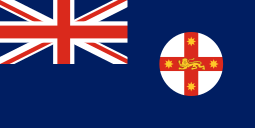
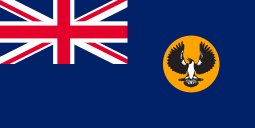
Additionally, the City of Ryde has adopted a unanimous motion dedicated to the centenary of the Armenian Genocide at its Council Meeting on April 14, 2015. The motion further calls on the Government of Australia to recognize and condemn all genocides.[132] The City of Willoughby passed a motion recognizing the Armenian Genocide on May 11, 2015.[133]
- Belgium
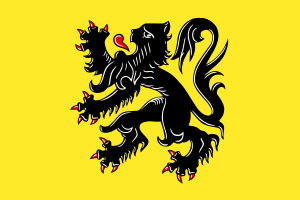
- Brazil
Parliaments of 4 Brazilian states recognize the Armenian Genocide:

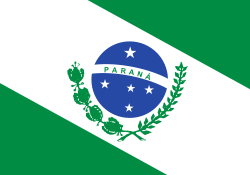

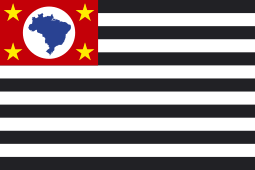
- Bulgaria

- Canada
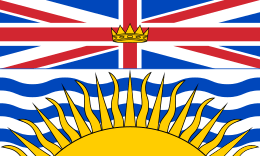
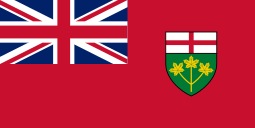
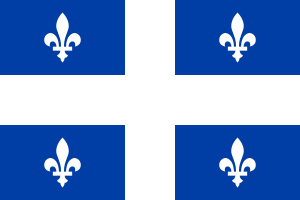
Additionally, the City of Montreal and the City of Toronto recognized the Armenian Genocide.[142]
- Egypt

- France
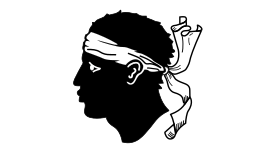

- Iran

- Israel

- Italy
Parliaments of 9 Italian regions recognize the Armenian Genocide:
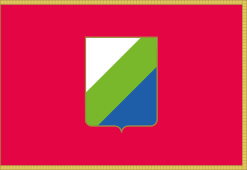
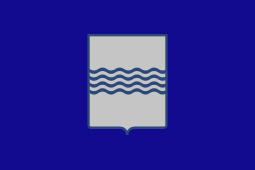
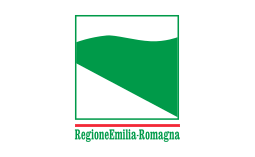
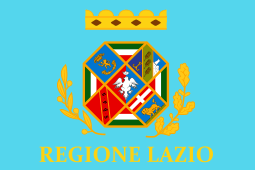
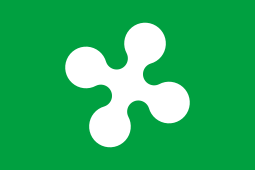
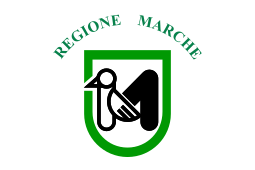
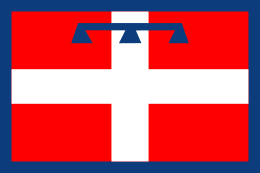
.svg.png)
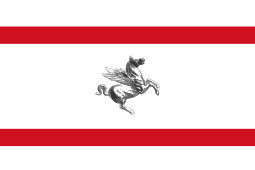
Additionally, almost 100 cities throughout Italy have recognized the Armenian Genocide, including Rome, Milan, Turin, Venice, Padua, Florence, Genoa, Livorno, Taranto, Trieste, Ancona, Perugia, Reggio Emilia and Parma.[157]
- Mexico

- Netherlands
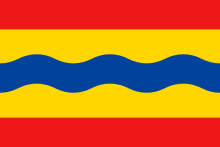
- Spain
Parliaments of 5 Spanish regions recognize the Armenian Genocide:
Additionally, 35 Spanish cities within 8 regions have recognized the Armenian Genocide:
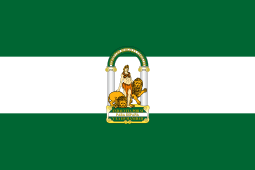
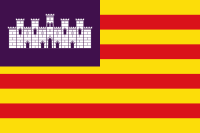
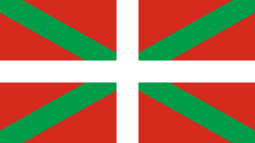
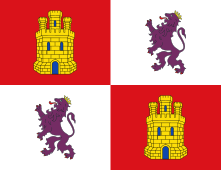
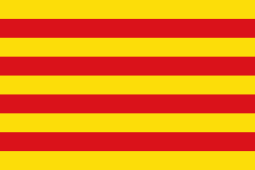
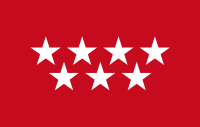
.svg.png)
.svg.png)

- Switzerland
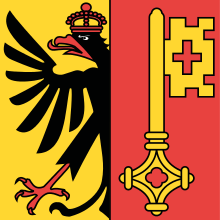
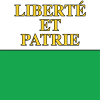
- United Kingdom
Two of the three devolved legislatures of the United Kingdom have recognised the Armenian Genocide.[200]

.svg.png)

- United States

- Other
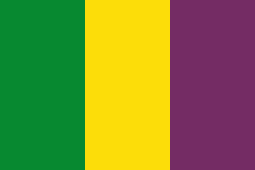
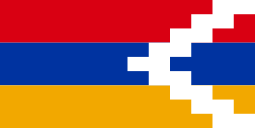
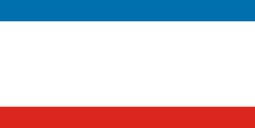
Position of Turkey
The verdict of the Turkish courts-martial of 1919–20 acknowledged the massacre of Armenians as "war crimes", and sentenced the perpetrators to death.[211] However, in 1921, during the resurgence of the Turkish National Movement, amnesty was given to those found guilty. Thereafter, the Turkish government, under Mustafa Kemal Atatürk, adopted a policy of denial.[211][212][213][214]
A major obstacle for wider recognition of the genocide in the world is the official position of Turkey, which states that there was no will to exterminate the Armenian population and the 1915 massacres were the consequences of Tehcir Law and World War I.[215]
In April 2006, the Turkish Human Rights Association recognized the events as a genocide.[216]
In December 2008, a group of Turkish intellectuals launched an online petition – named the "I Apologize" campaign ('Özür Diliyorum' in Turkish) – for people wanting to apologize in a personal capacity. The writers of the petition used the word "the Great Catastrophe" regarding the events. The petition gained upwards of 10,000 signatures in a matter of days. In the face of a backlash,[217] then Turkish president Abdullah Gül defended the petition, citing freedom of speech.[218] An opposition group soon launched a website raising an even higher number of signatures. Recep Tayyip Erdogan, at the time Prime Minister, sided with the opposition, and a national debate ensued.[219]
Since the "I Apologize" campaign in 2008, every year on April 24, commemoration ceremonies for the genocide are held in several Turkish cities. They started at Taksim Square in Istanbul in 2008, mainly as a result of the nationwide discussion that came after the assassination of Hrant Dink and then spread to Ankara, Diyarbakır, İzmir, Malatya, and Mersin in the following years.[220] The commemorations draw increasing support each year.
Greens and the Left Party of the Future had announced that they recognized the Armenian Genocide in 2014.[221]
Position of the United States

In 1951, the United States Department of State did actually exemplify the Armenian case as one of the committed acts of genocide in recent past. This view is evident in the written statement by United States given to the International Court of Justice (ICJ) that year, observing that: "The Genocide Convention resulted from the inhuman and barbarous practices which prevailed in certain countries prior to and during World War II, when entire religious, racial and national minority groups were threatened with and subjected to deliberate extermination. The practice of genocide has occurred throughout human history. The Roman persecution of the Christians, the Turkish massacres of Armenians, the extermination of millions of Jews and Poles by the Nazis are outstanding examples of the crime of genocide. This was the background when the General Assembly of the United Nations considered the problem of genocide."[222] That the USA later dramatically changed this position and has since consistently refrained from officially use the term "genocide" about the WWI events can be ascribed to the rise of the Cold War era and Turkey's NATO membership along with the disappearance of Raphael Lemkin as a strong human rights advocate from the ranks of the US State Department.[7]
Several official U.S. documents describe the events as genocide. The United States House of Representatives adopted resolutions commemorating the Armenian Genocide in 1975,[223][224] 1984[225] and 1996.[226] President Ronald Reagan also described the events as genocide in his speech on April 22, 1981.[227] The legislatures of 49 out of the 50 U.S. states have made individual proclamations recognising the events of 1915 to 1923 as genocide.[205][228] As of March 4, 2010, the United States House Committee on Foreign Affairs has recognized the massacres of 1915 as genocide.[229]
The United States government first acknowledged the Armenian Genocide back in 1951, in a document it submitted to the International Court of Justice, commonly known as the World Court.[8]
House Joint Resolution 148, adopted on April 8, 1975, resolved: "Authorizes the President to designate April 24, 1975, as 'National Day of Remembrance of Man's Inhumanity to Man' for remembrance of all the victims of genocide, especially those of Armenian ancestry who succumbed to the genocide perpetrated in 1915."[224]
After the tenure of Ronald Reagan, later United States Presidents have refused to name the events as such because of concerns over alienating Turkey.[230]
The Armenian Assembly of America (AAA) and the Armenian National Committee of America (ANCA), advocacy organizations representing the views and values of the Armenian American community in the United States, have been urging Congress and the President of the United States to recognize the genocide by Ottoman Turkey in 1915.[231] They have also asked for an increase of economic aid to Armenia.
The U.S. House Committee on Foreign Affairs approved HR 106, a bill that categorized and condemned the Ottoman Empire for the Genocide, on October 10, 2007, by a 27–21 vote. However, some of the support for the bill from both Democrats and Republicans eroded after the White House warned against the possibility of Turkey restricting airspace as well as ground-route access for U.S. military and humanitarian efforts in Iraq in response to the bill.[230] In response to the House Foreign Affairs Committee's decision on the bill, Turkey ordered their ambassador to the United States to return to Turkey for "consultations".[232] The Turkish lobby worked intensely to block the bill's passage.[232]
On January 19, 2008 United States Senator Barack Obama released a statement:
Two years ago, I criticized the Secretary of State for the firing of U.S. Ambassador to Armenia, John Evans, after he properly used the term genocide to describe Turkey's slaughter of thousands of Armenians starting in 1915. I shared with Secretary Rice my firmly held conviction that the Armenian Genocide is not an allegation, a personal opinion, or a point of view, but rather a widely documented fact supported by an overwhelming body of historical evidence. The facts are undeniable. An official policy that calls on diplomats to distort the historical facts is an untenable policy. As a senator, I strongly support passage of the Armenian Genocide Resolution (H.Res.106 and S.Res.106), and as President I will recognize the Armenian Genocide.[233]
After becoming president he retreated from those statements, stating only that his opinion had not changed but refused to use the word genocide. Despite his previous public recognition and support of genocide bills, as well as the election campaign promises to formally recognize the Armenian Genocide,[234] Obama abstained from using the term "genocide".[235] On April 24, 2009, he stated as president:
I have consistently stated my own view of what occurred in 1915, and my view of that history has not changed. My interest remains the achievement of a full, frank and just acknowledgment of the facts.[236]
On April 24 commemoration speeches, Obama referred only to the Armenian synonym Mets Eghern ("Mec Eġeṙn"). On April 24, 2010 Obama stated:
On this solemn day of remembrance, we pause to recall that ninety-five years ago one of the worst atrocities of the 20th century began. In that dark moment of history, 1.5 million Armenians were massacred or marched to their death in the final days of the Ottoman Empire. Today is a day to reflect upon and draw lessons from these terrible events. I have consistently stated my own view of what occurred in 1915, and my view of that history has not changed. It is in all of our interest to see the achievement a full, frank and just acknowledgment of the facts. The Mets Yeghern is a devastating chapter in the history of the Armenian people, and we must keep its memory alive in honor of those who were murdered and so that we do not repeat the grave mistakes of the past.[237][238][239][240]
Also in 2012,[241] 2013,[242] 2014[243] 2015,[244][245] and 2016[246] he did not use the word 'genocide'. In April 2015, Obama sent a Presidential Delegation to Armenia to attend the Centennial Commemoration in Yerevan.[247] Susan E. Rice, Obama's National Security Advisor, encouraged the Foreign Minister Mevlüt Çavuşoğlu of Turkey to take concrete steps to improve relations with Armenia and to facilitate an open and frank dialogue in Turkey about the atrocities of 1915.[248]
On October 29, 2019, the United States House of Representatives passed a resolution on a 405–11 vote to recognize the Armenian genocide. The United States Senate passed the resolution through unanimous vote on December 12, 2019.[249]
Kurdish position
Some Kurdish tribes played a role in the genocide, as they were an important tool used by the Ottoman authorities to carry out the killings.[250] Among modern Kurds, including major Kurdish parties like the Peoples' Democratic Party (HDP), and the Kurdistan Democratic Party (KDP), most of them acknowledge the killings and apologize in the name of their ancestors who committed atrocities toward Armenians and Assyrians in the name of the Ottoman Empire.[251][252][253][254][255]
Position of France

France has formally recognized the Armenian massacres as genocide.[256]
In 2006, the French Parliament submitted a bill to create a law that would punish any person denying the Armenian Genocide with up to five years' imprisonment and a fine.[257] Despite Turkish protests,[258] the French National Assembly adopted a bill making it a crime to deny that Armenians suffered genocide in 1915 at the hands of the Ottoman Turks.[259] The bill had been criticized as an attempt to garner votes from among the 600,000 ethnic Armenians of France.[260] This criticism has come not only from within Turkey,[261] but also from Orhan Pamuk.[262] However, the bill was dropped in the summer of 2011 before going to the Senate.[263]
Since then, France has urged Turkey to recognize the 1915 massacre as genocide.[264]
The French Senate passed a bill in 2011 that criminalizes denial of acknowledged genocides, which includes both the Holocaust and the Armenian Genocide. The bill was submitted by the parliament in 2012.[265] However, the bill was considered unconstitutional on February 28, 2012 by the French Constitutional Court: "The council rules that by punishing anyone contesting the existence of... crimes that lawmakers themselves recognized or qualified as such, lawmakers committed an unconstitutional attack on freedom of expression".[266]
The French Senate adopted a new bill on October 14, 2016 that made the denial of the Armenian Genocide a crime. The bill was introduced by the French Government and passed by the French National Assembly in July 2016, and stipulates a penalty of a year in prison or a 45,000 Euro fine.[88] However, the law was put down by the French Constitutional Court in January 2017. The Council said the "ruling causes uncertainty regarding expressions and comments on historical matters. Thereby, this ruling is an unnecessary and disproportionate attack against freedom of speech."[267]
On February 5, 2019, French President Emmanuel Macron declared April 24 as Armenian Genocide commemoration day in France.[89]
Position of the United Kingdom
The devolved legislatures of Scotland and Wales have formally recognised the Armenian Genocide. The government of the United Kingdom does not recognize the Armenian Genocide, as it considers that the evidence is not clear enough to retrospectively consider "the terrible events that afflicted the Ottoman Armenian population at the beginning of the last century" to be genocide under the 1948 UN convention. The British government states the "massacres were an appalling tragedy" and condemns them, stating that this was the view of the government during that period.[200] In 2006, an early day motion recognising the Armenian Genocide by the UK Parliament was signed by 182 MPs.[268][269]

However, in 2007, the position of the British government was that it condemns the massacres, but "neither this Government nor previous British Governments have judged that the evidence is sufficiently unequivocal to persuade us that these events should be categorised as genocide as defined by the 1948 UN Convention on Genocide, a convention which is, in any event, not retrospective in application."[270] In 2009, the lawyer Geoffrey Robertson QC revealed in a disclosure of Foreign Office documents entitled "Was there an Armenian Genocide?",[271] how the British Parliament has routinely been misinformed and misled by ministers who have recited FCO briefs without questioning their accuracy. As summarized by Robertson, "there was no 'evidence' that had ever been looked at and there had never been a 'judgment' at all."[272] A 1999 Foreign Office briefing for ministers said that the recognition of the Armenian Genocide would provide no practical benefit to the UK and goes on to say that "The current line is the only feasible option" owing to "the importance of our relations (political, strategic and commercial) with Turkey". The Foreign Office documents furthermore include advice from 1995 to the then Conservative foreign minister, Douglas Hogg, that he should refuse to attend a memorial service for the victims of the genocide.[273] As of 2015, the United Kingdom does not formally recognise the Ottoman Empire's massacres of Armenians as a "genocide".[274]
James Bryce (1838–1922), 1st Viscount Bryce, was one of the first Britons to bring this issue to public attention.[275][276]
Position of Australia
Australia does not view the events at the end of the Ottoman Empire as a genocide.[277] Australia is one of the countries who were at war with the Ottoman Empire at the time of the events, notably during the Gallipoli Campaign. Australia does acknowledge the tragic events had devastating effects on the identity, heritage, and culture of all the people in the areas that the events have occurred. Furthermore, in response to the motions of New South Wales and South Australia to recognize the events as genocide the Foreign Minister of Australia has clarified on June 4, 2014, that Australian states and territories have no constitutional role in the formulation of the Australian foreign policy, and that Australia does not view the tragic events at the end of the Ottoman Empire as a genocide.[277]
Position of Israel
Officially Israel neither recognizes nor denies the Armenian Genocide. This stems from a few geopolitical considerations. First, according to The Times of Israel, "Israel is a small country in a hostile neighborhood that can't afford to antagonize the few friends it has in the region. Even more powerful states refuse to employ the 'genocide' term for fear of alienating Turkey...."[278] Second, Israel shares a "budding friendship" with Azerbaijan, a "Shiite Muslim but moderate country bordering Iran" that also strongly opposes recognition.[278] Third, according to former Israeli minister Yossi Sarid (one of the country's most vocal supporters of Armenian Genocide recognition), Israel tends to follow policies set by the United States, which had not recognized it.[279] Despite these concerns, many prominent Israeli figures from different sides of the political spectrum have called for recognition.[278][279]
In 2003, the Catholicos of All Armenian Karekin II visited the then Ashkenazi Chief Rabbi of Israel Yona Metzger who accepted an invitation by Karekin II to visit Armenia,[280] a trip that he made in 2005, including a visit to the Tsitsernakaberd (the Genocide Memorial in Yerevan).[281] While doing so he formally recognised the Armenian Genocide as a historical fact.[282]
Israel appeared to move closer to officially recognizing the genocide in 2011 when the Knesset held its first open discussion on the matter. By a unanimous vote of 20–0, the Knesset approved referring the subject to the Education Committee for more extensive deliberation.[283] Israel's speaker of the Knesset told an Israel-based Armenian action committee that he intended to introduce an annual parliamentary session to mark the genocide.[284] A special parliamentary session held in 2012 to determine if Israel would recognize the Armenian Genocide ended inconclusively. Then–Knesset Speaker Reuven Rivlin and Cabinet Minister Gilad Erdan were among those supporting formal recognition by the government.[285] The recognition was not approved at that time and in 2015, Rafael Harpaz, Israel's ambassador to Azerbaijan, said in an interview that Foreign Minister Avigdor Lieberman has made it clear that Israel will not recognize the Armenian Genocide, given Israel's hopes that its political and economic relationship with Turkey can improve.[286] Another great concern is Azerbaijan, which is Israel's main oil supplier, a buyer of Israeli arms, and a Muslim ally in the global coalition against Iran.[287]
MKs supporting recognition have acknowledged the effect it could have on Israel–Azerbaijan and Israel–Turkey relations. As then Knesset Spokesperson Rivlin said, "Turkey is and will be an ally of Israel. The talks with Turkey are understandable and even necessary from a strategic and diplomatic perspective. But those circumstances cannot justify the Knesset ignoring the tragedy of another people" and Ayelet Shaked (of the religious-nationalist Jewish Home party) said: "We must confront our silence and that of the world in the face of such horrors."[288][289] In 2000, then–education minister Yossi Sarid, chairman of the dovish Meretz party, announced plans to place the Armenian Genocide on Israel's history curricula.[278] As a result of Sarid's 2000 speech to an Armenian church in Jerusalem recognizing their genocide, he became persona non grata in Turkey.[279] Meretz has long fought for recognition of the genocide.[287] Zehava Galon, a successor of Sarid as Meretz leader, has initiated several motions in the Knesset calling for the government to recognize the Armenian Genocide. In 2013 she said, "Reconciliation with Turkey is an important and strategic move, but it should not affect the recognition."[289] Her 2014 motion also enjoyed much support on the Knesset floor, including that of Knesset Speaker Yuli Edelstein.[290] Galon has also paid her respects at local Armenian memorial services.[291]
Rivlin, now president of Israel, was one of the Knesset's most outspoken proponents of recognition. It was reported in 2014 that due to the sensitivities of Israel's relationship with Turkey, Rivlin was quietly distancing himself from the Israeli campaign to recognize the Armenian Genocide and chose not to sign the annual petition, which he had previously done.[292] Still, Israel has taken greater steps toward Armenian Genocide recognition under Rivlin's presidency. Rivlin was the first Israeli president to speak at the United Nations on the issue.[293] During the United Nations Holocaust Memorial on January 28, 2015, President Rivlin spoke about the Armenian tragedy.[294] It was observed that in his speech he used the phrase רצח בני העם הארמני reẓaḥ bnei haʿam haArmeni, which means "the murder of the members of the Armenian nation," coming close to the Hebrew term for genocide, רצח עם reẓaḥ ʿam.[295] In addition, 2015 marked the first time that Israel sent a delegation—Nachman Shai (Zionist Union) and Anat Berko (Likud)—to Yerevan for the official memorial event. In an event billed as the first to be held by an Israeli president to commemorate the tragedy, Rivlin also invited Armenian communal and religious leader's to his official residence on April 26, 2015. He said we are "morally obligated to point out the facts, as horrible as they might be, we must not ignore them." As he skirted using the term "genocide," some Armenian leaders were disappointed, though still thankful for the event.[295] However, it was later reported that earlier that same month, while briefing foreign journalists in English, Rivlin had in fact referred to the killings as genocide, saying:
It was Avshalom Feinberg, one of my eldest brothers, who said 25 years before the Holocaust that if we do not warn against what is going on with the Armenians, what will happen afterwards when they try to do to us…? There is a saying that the Nazis used the Armenian genocide as something that gave them permission to bring the Holocaust into reality, according to their belief that they have to discriminate against the Jewish people. 'Never again' belongs to every one of you, all the nations. We cannot allow something like that to happen."[293]
In 2015, a group of distinguished Israeli academics, artists, and former generals and politicians signed a petition calling on Israel to follow the Pope's lead and recognize the genocide.[279] The signatories included author Amos Oz, historian Yehuda Bauer, Major General (ret.) Amos Yadlin, former Likud minister Dan Meridor and about a dozen former MKs and ministers.[278]
Israeli President Reuven Rivlin visited the Armenian Patriarchate of Jerusalem on May 9, 2016. Concluding his speech he said, that "the Armenians were massacred in 1915. My parents remember thousands of Armenian migrants finding asylum at the Armenian Church. No one in Israel denies that an entire nation was massacred."[296]
On August 1, 2016, the Knesset Committee on Education, Culture and Sports recognized the Armenian Genocide.[297]
Position of other countries

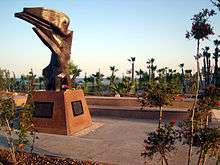
Azerbaijan, which is in a strategic alliance with Turkey and is in conflict with Armenia because of the Nagorno-Karabakh War, shares the position of Turkey. During the Communist rule, when Azerbaijan was a part of the USSR, a brief description of the Armenian Genocide was placed in the Azerbaijani Soviet Encyclopedia.[298]
The Ukrainian town Izyum recognized the killings as genocide on New Year's Eve 2009 but after lobbying by the Azerbaijani community of Crimea, their city council canceled that decision on April 1, 2010. This is the first case in the world when the decision on a recognition was cancelled.[299]
Denmark believes (2008) that the genocide recognition should be discussed by historians, not politicians.[300] However, on January 26, 2017 the Danish Parliament adopted a resolution regarding the Armenian Genocide, which recognizes the "tragic and bloody events that took place in eastern Anatolia in the period 1915–1923".[301]
In Bulgaria, activists first tried to persuade the parliament to acknowledge the genocide in 2008, but the proposal was voted down.[302] Shortly after the decision of the parliament, several of the biggest municipalities in Bulgaria accepted a resolution recognising the genocide.[303] The resolution was first passed in Plovdiv followed by Burgas, Ruse, Stara Zagora, Pazardzhik and others. In 2015, however, the Bulgarian parliament adopted a declaration recognising the "mass extermination of the Armenian People in the Ottoman Empire" in the period 1915–1922, but did not use the word "genocide".[75][304]
The Armenian diaspora and the genocide's recognition



By the 1970s, Armenian Americans, who had accumulated some wealth and political power, started efforts to lobby the U.S. government to recognize the genocide.[305]
The Armenian National Committee of America (ANCA) and the Armenian Assembly of America (AAA) lobby for recognition in the United States Congress, often in opposition to the Turkish lobby.[231][306]
During the later stages of the Cold War, fringe militant movements among Armenians arose. One of the goals of these Armenian militants was to agitate world governments for Turkish and international recognition of the Armenian Genocide. Attacks on Turkish diplomats were committed in Europe, Asia and America. Two active groups which committed many of these attacks were the Armenian Secret Army for the Liberation of Armenia (ASALA) and the Armenian Revolutionary Army (ARA);[306] both organizations stopped their military activities in the late 1980s.
The Armenian community in Kolkata, India, numbering approximately 150 people,[307] travel to the St John's Church in Chinsurah, annually, to observe Armenian Genocide Remembrance Day.[308] The community, along with visitors from countries such as Iran, Lebanon and Moscow held a memorial service at the 300-year-old Armenian Holy Church of Nazareth in Kolkata to mark the 100th anniversary of the genocide.[309] Armenian students at the Jawaharlal Nehru University in New Delhi organised a candle lighting ceremony in the university campus and at the Sacred Heart Cathedral in the city to mark the anniversary. A commemoration ceremony was also held at the Armenian Church in Chennai.[310]
Developments since 2000
On March 29, 2000 the Swedish parliament approved a report, recognizing the Armenian Genocide and calling for Turkey's greater openness and an "unbiased independent and international research on the genocide committed against the Armenian people".[311] On June 12, 2008, the Swedish parliament voted by 245 to 37 (with 1 abstention, 66 absences) to reject a call for recognition of the 1915 genocide of the Ottoman Empire. On June 11 a long debate took place in the Swedish Parliament in regard to the Foreign Committee report on Human Rights, including five motions calling upon the Swedish Government and Parliament to officially recognize the genocide.[312] The MPs adhered to the recommendation by the Swedish Foreign Ministry and Foreign Committee, arguing that there are "disagreements among scholars" in regard to the nature of the World War I events in Turkey, the non-retroactive nature of the UN Genocide Convention, and that the issue "should be left to historians". However, the Foreign Committee report stated that "the Committee understands that what happened to Armenians, Assyrians/Syrians and Chaldeans during the Ottoman Empire's reign would probably be regarded as genocide according to the 1948 convention, if it had been in power at the time of the event".[313] Three days prior to the debate in the Parliament, a petition, signed by over 60 renowned genocide scholars was published, calling on politicians in general, and the Swedish parliamentarians in specific, not to abuse the name of science in denying a historic fact.[314] On March 11, 2010, the Swedish parliament recognized the genocide.[315]
In 2001, Abd al-Qadir Qaddura, speaker of the Syrian Parliament, became the first high-ranking Syrian official to acknowledge the Armenian genocide when he wrote in the Book of Remembrance of the Armenian Genocide Monument and Museum in Yerevan: "As we visit the Memorial and Museum of the Genocide that the Armenian nation suffered in 1915, we stand in full admiration and respect in front of those heroes that faced death with courage and heroism. Their children and grandchildren continued after them to immortalize their courage and struggle. … With great respect we bow our heads in memory of the martyrs of the Armenian nation — our friends — and hail their ability for resoluteness and triumph. We will work together to liberate every human being from aggression and oppression." In 2014 Syrian President Bashar al-Assad became the first Syrian head of state to acknowledge the mass murders of Armenians and identify the perpetrator as Ottoman Turkey, stating, "The degree of savagery and inhumanity that the terrorists have reached reminds us of what happened in the Middle Ages in Europe over 500 years ago. In more recent modern times, it reminds us of the massacres perpetrated by the Ottomans against the Armenians, when they killed a million and a half Armenians and half a million Orthodox Syriacs in Syria and in Turkish territory." Although Assad did not use the world genocide, two days after Assad's statement Bashar Jaafari, Syria's ambassador to the United Nations in Geneva, stated, "How about the Armenian Genocide where 1.5 million people were killed?"[316]
On September 9, 2004, President Mohammad Khatami of Iran visited the Armenian Genocide Memorial at Tsitsernakaberd in Yerevan.[317]
On June 15, 2005 the German Bundestag passed a resolution that "honors and commemorates the victims of violence, murder and expulsion among the Armenian people before and during the First World War". The German resolution also states:
The German parliament deplores the acts of the Government of the Ottoman Empire regarding the almost complete destruction of Armenians in Anatolia and also the inglorious role of the German Reich in the face of the organized expulsion and extermination of Armenians which it did not try to stop. Women, children and elderly were from February 1915 sent on death marches towards the Syrian desert.
The expressions "organized expulsion and extermination" resulting in the "almost complete destruction of Armenians" is sufficient in any language to amount to formal recognition of the Armenian Genocide, although of course the crime of 'genocide' had not been legally defined in 1915. The Resolution also contains an apology for German responsibility as a then ally of Turkey.[318][319]
On September 4, 2006, Members of the European Parliament voted for the inclusion of a clause prompting Turkey "to recognize the Armenian genocide as a condition for its EU accession" in a highly critical report, which was adopted by a broad majority in the foreign relations committee of the European Parliament.[320][321] This requirement was later dropped on September 27, 2006 by the general assembly of the European Parliament by 429 votes in favor to 71 against, with 125 abstentions.[322] In dropping the pre-condition of acceptance of the Armenian Genocide, (which could not be legally demanded of Turkey), The European Parliament said: "MEPs nevertheless stress that, although the recognition of the Armenian genocide as such is formally not one of the Copenhagen criteria, it is indispensable for a country on the road to membership to come to terms with and recognize its past."
On September 26, 2006, the two largest political parties in the Netherlands, Christian Democratic Appeal (CDA) and the Labour Party (PvdA), removed three Turkish-Dutch candidates for the 2006 general election, because they either denied or refused to publicly declare that the Armenian Genocide had happened. The magazine HP/De Tijd reported that the number 2 of the PvdA list of candidates, Nebahat Albayrak (who was born in Turkey and is of Turkish descent) had acknowledged that the term "genocide" was appropriate to describe the events. Albayrak denied having said this and accused the press of putting words in her mouth, saying that "I'm not a politician that will trample my identity. I've always defended the same views everywhere with regard to the 'genocide'".[323] It was reported that a large section of the Turkish minority were considering boycotting the elections.[324] Netherlands' Turkish minority numbers 365,000 people, out of which 235,000 are eligible to vote.
On November 29, 2006, the lower house of Argentina's parliament adopted a resolution recognizing the Armenian Genocide. The bill was overwhelmingly adopted by the assembly and declared April 24, the international day of remembrance for the Armenian genocide as an official "day of mutual tolerance and respect" among peoples around the world.
On April 20, 2007, the Basque Parliament approved an institutional declaration recognising the Armenian Genocide. The Basque Parliament included six articles where it affirms the authenticity of the Armenian Genocide and declares sympathy to the Armenians, while at the same time denouncing Turkey's negation of the genocide and its economic blockade imposed on Armenia.[325]
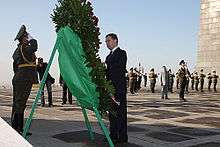
On June 5, 2007, the Chilean Senate unanimously adopted a legislation recognising the Armenian Genocide and urging its government to support a key 1985 United Nations Subcommission report properly describing this crime against humanity as a clear instance of genocide.[326]
On November 23, 2007, the Mercosur parliament adopted a resolution recognising the "Armenian Genocide, perpetrated by the Ottoman Empire, which took 1.5 million lives from 1915 to 1923". The Mercosur resolution also expressed its support for the Armenian Cause and called on all countries to recognize the genocide.[327]
On March 5, 2010, the Catalan Parliament recognized the Armenian Genocide on the initiative of the members of Barcelona's Friendship Union with Armenia.[163]
On March 11, 2010 the Swedish Parliament voted to describe the massacre of Armenians by the Ottoman Empire in 1915 as genocide. The resolution was adopted with 131 deputies voting in favour of the resolution and 130 voting against it.
On March 25, 2010 the Serbian Radical Party submitted a draft resolution to the Serbian parliament condemning the genocide committed by Ottoman Turkey against Armenians from 1915 to 1923. SRS submitted the draft so that Serbia can join the countries which have condemned the genocide.[328] As of March 10, 2014, Serbia does not recognize the events as a genocide,[329] thus it can be said the draft has failed.
On February 17, 2011, Chinese foreign minister Yang Jiechi paid tribute to the memory of the Armenian Genocide victims during his visit to Armenia. He also met with the head of Armenia's national church, Catholicos of All Armenians Karekin II, and discussed the recognition of the Armenian Genocide.[330]
Despite the fact that the Czech Republic has not formally recognized the Armenian Genocide, during his meeting with Armenia's President Serzh Sargsyan in January 2014, the Czech President Miloš Zeman stated: "Next year marks the 100th anniversary of the Armenian Genocide. In 1915 1.5 million Armenians were killed."[331]
On June 20, 2014, the Presbyterian Church (USA) adopted a resolution recognizing the Armenian Genocide and adopting the 2015 church calendar designating April 26 as the day for its observance.[53][54] It also directed the church's Mission Agency to prepare educational and liturgical resources for member churches in preparation for this event.[54] This resolution was the first of its kind for a major American church body.[54]
On June 23, 2014 the parliament of Spain's autonomous community of Navarre adopted a measure recognizing the Armenian Genocide. The measure came after a series of visits by members of the Navarre parliament to Armenia and Artsakh.[332]
On November 26, 2014, the Plurinational Legislative Assembly of Bolivia unanimously passed a resolution in solidarity with the claims of the Armenian people and condemning "all denialist policy regarding the genocide and crimes against humanity suffered by the Armenian nation."[333]
On March 11, 2015, American actor George Clooney showed solidarity and support in a day of remembrance marking the 100th anniversary of the Armenian Genocide at an event in New York City. Clooney took to the stage and spoke about the significance of the centennial and of recognizing the genocide. Clooney was joined by his wife Amal Clooney, who went before Europe's top human rights court in January, representing Armenia, to argue against a man convicted of denying the 1915 Armenian Genocide.
On March 17, 2015, the People's Council of Syria—during a session dedicated to the 100th anniversary of the genocide—condemned the Ottoman Empire for its responsibility for the Armenian Genocide. The speaker of the parliament Mohammad Jihad al-Laham issued a statement on behalf of the members, where he expressed solidarity with the Armenians worldwide in their struggle for justice.[334]
On March 27, 2015, Armenian and Greek youth held a protest in the Greek capital of Athens. Protesters demanded that European Union member states end denial policies, recognize the Armenian Genocide, and subject deniers to criminal liability. The protesters further called on the European Union to pressure Turkey to recognize the genocide and take action to compensate for the material and non-material losses and restoration of the historic rights of the Armenian nation.[335]
On April 2, 2015, the popular American band System of a Down embarked on their Wake Up The Souls Tour, which kicked off April 6 and culminates with the band's first performance in Armenia's capital city of Yerevan on April 23. "The goal is to raise awareness about the Armenian Genocide, and also to put the idea into people's minds that justice can prevail, even if it's been a hundred years," said band member Serj Tankian. The group will visit a total of 14 cities across the world.[336]
On April 4, 2015, forty-nine members of the United States House of Representatives have written a letter to U.S. President Barack Obama urging him to recognize the mass killings of the Armenians at the hands of the Ottomans in 1915 as genocide, claiming that the move will help improve Armenia–Turkey relations. The lawmakers said a clear recognition of the 1915 events as genocide, as Armenians mark its centennial this year, would affirm that it is not an allegation but a "widely documented fact supported by an overwhelming body of historical evidence." [337]
On April 6, 2015, Armenian-American reality stars Kim Kardashian and Khloé Kardashian traveled to Armenia. During their stay, the sisters visited the Tsitsernakaberd Genocide Memorial in Yerevan and in-doing so, brought global media attention to the recognition of the Armenian Genocide. Kim Kardashian's husband Kanye West also visited the Republic.[338]
On April 7, 2015, the Ngāpuhi leader David Rankin has called for Māori people to boycott this year's centennial ANZAC commemorations because the Turkish Government is using the event to deflect attention from the Armenian Genocide. Mr Rankin stated that "the Armenian population was slaughtered by the colonizing Turks and our involvement in the ANZAC centennial at Gallipoli is supporting the genocide of the colonizer. Mr Rankin is calling on the Maori of New Zealand and other indigenous groups to boycott this year's ANZAC Day events and as a sign of their solidarity with the Armenians, to stop wearing poppies this year.[339] The Green Party of Aotearoa New Zealand also supports the move to recognize the Armenian Genocide. The Green Party human rights spokesperson Catherine Delahunty stated that New Zealand should be using its spot on the United Nations Security Council to advocate for genocide recognition.[340]
On April 12, 2015, Pope Francis described the massacres of 1.5 million Armenians in Ottoman Turkey as "the first genocide of the 20th century" during an unprecedented Vatican Mass dedicated to the 100th anniversary of the tragedy. Francis remembered the victims of "that immense and senseless slaughter" at the start of the Mass at St. Peter's Basilica, which was attended by President Serzh Sarkisian, the supreme heads of the Armenian Apostolic Churches and hundreds of Armenian Catholics.[341] Turkey responded by recalling its ambassador to the Holy See.[342]
On April 14, 2015, the Parliament of Corsica adopted a resolution recognizing the fact of the Armenian Genocide. With this resolution, the Corsican Assembly urged Turkey to recognize the Genocide and normalize relations with Armenia. The resolution was introduced by the Femu a Corsica political coalition.[343]
On April 15, 2015, the European Parliament adopted a resolution by a majority vote that calls the massacre a century ago of up to 1.5 million Armenians by Ottoman Turkish forces a genocide. The motion, which garnered support from all political groups, encouraged Turkey to "use the commemoration of the centenary of the Armenian Genocide as an important opportunity" to open its archives, "come to terms with its past" as well as recognize the genocide. By doing so, Turkey would pave the way for a "genuine reconciliation between the Turkish and Armenian peoples". The document calls on Turkey to restore its diplomatic ties with Armenia, open the border and strive for economic integration.[344] The European Parliament further called on all European Union member states to recognize the Armenian Genocide.[345]
On April 17, 2015, Armenian religious and secular organizations in Georgia have petitioned the country's parliament to begin formal debates on the recognition of the Armenian Genocide.[346] On April 24, 2015, thousands marched in the province of Javakheti demanding that Turkey recognize the genocide. Another rally took place near the Turkish embassy in Tbilisi.[347]
On April 18, 2015, the Austrian People's Party and the Social Democratic Party of Austria presented a resolution that condemns the Armenian Genocide to the Parliament of Austria.[348] On April 21, 2015 the Austrian parliament officially adopted a statement condemning the Armenian Genocide and called on Turkey to face its past. All six factions of the Austrian parliament signed up to the statement that also emphasizes the responsibility of Austria-Hungary, as an ally of the Ottoman Empire during World War I, in the Armenian Genocide.[349]
On April 20, 2015, German Chancellor Angela Merkel's spokesman Steffen Seibert said the government of Germany would support a resolution in parliament on Friday declaring the Armenian Genocide an example of genocide. Chancellor Angela Merkel and her coalition, including the Christian Democratic Union of Germany will vote on April 24 to label the murders as genocide as defined by the United Nations in 1948. The lower house vote is on the same day as leaders meet in the Armenian capital of Yerevan to commemorate the massacre that began in April 1915. Germany has been under pressure from some of its European partners to follow their example and more fully recognize the depth of the Armenian tragedy.[350]
On April 21, 2015, members of the Serbian opposition political group New Party, submitted a draft resolution on the recognition and condemnation of genocide perpetrated by the Ottoman Empire to the Parliament of Serbia. New Party is calling on the Serbian government and citizens to observe April 24 as a day of remembrance of the victims of the Armenian Genocide. The draft resolution also calls on other countries, including Turkey, and international organizations to recognize and condemn the genocide against the Armenian people in the hopes to prevent such crimes from happening in the future.[351]
On April 22, 2015, Israeli President Reuven Rivlin spoke out strongly on the question of the Armenian Genocide in a closed session with journalists in Jerusalem. Rivlin drew a direct historical link between the world's failure to prevent the Armenian Genocide and the Holocaust. "The Nazis," he said, "used the Armenian Genocide as something that gave them permission to bring the Holocaust into reality." [352]
On April 22, 2015, the President of Armenia, Serzh Sargsyan expressed his gratitude to the People's Council of Syria for its steps aimed at the recognition of the Armenian Genocide. The speaker of the People's Council of the Syrian Arab Republic, Mohammad Jihad al-Laham, stated that Syria recognizes the Armenian Genocide committed by the Ottoman Empire.[353]
On April 23, 2015, Russian President Vladimir Putin described the 1915 Armenian massacres in Ottoman Turkey as genocide ahead of his participation in upcoming official ceremonies in Yerevan to mark the 100th anniversary of the tragedy. "One century on, we bow our heads in memory of all victims of this tragedy which our country has always perceived as its own pain and calamity," he said.[354]
On April 23, 2015, the Flemish Parliament of Belgium unanimously adopted a resolution to fully recognize the Armenian Genocide. The motion was put forward by all political parties of Flanders including the Christen-Democratisch en Vlaams party. The motion further called on Turkey to recognize the massacres as a genocide.[355]
On April 24, 2015, the President of Serbia, Tomislav Nikolić, stated that the people of Serbia realize what happened to the Armenians in the Ottoman Empire and that a monstrous genocide did occur. The President, along with other world leaders, travelled to the Armenian capital of Yerevan to commemorate the centennial of the genocide. The denial of historical truth adversely affects the level of awareness," the Serbian president stressed, and added: "We have not come here to be against or for someone, but to honor the memory of the victims of the people of Armenia." [356]
On April 24, 2015 in Los Angeles, more than 130,000 people took part in the March for Justice to mark the centennial of the Armenian Genocide. Demonstrators started the march from the Little Armenia neighborhood and proceeded to walk 10 km (6 mi) to the Turkish consulate. Demonstrators demanded that the killing of around 1.5 million Armenians by Ottoman Turks in 1915 be recognized as a genocide.[357]
On April 24, 2015, the lights of the Eiffel Tower in Paris and the Coliseum in Rome went dark in recognition and remembrance of the Armenian Genocide. Several media outlets reported that Europe stood with Armenia at this time.[358]
On April 25, 2015, the entire political elite of Uruguay participated in commemorating the centennial of the Armenian Genocide in Montevideo. Among the participants were President Tabaré Vázquez and Vice-President Raúl Fernando Sendic Rodríguez. The high-ranking guests talked about the need for international recognition of the Armenian Genocide and criticized Turkey's denial. Uruguay was the first country to recognize the Armenian Genocide in 1965.[359]
Throughout April 2015, several American states have adopted resolutions on the occasion of the Armenian Genocide centennial. Wisconsin commemorated the "Day of Remembrance for the 100th Anniversary of the Armenian Genocide of 1915 to 1923 with a joint resolution. Pennsylvania unanimously passed H.R. 265 designating April 24, 2015, as "Pennsylvania's Day of Remembrance of the 100th anniversary of the Armenian Genocide. Tennessee passed HR 100 designating April 24 as the official day of remembrance for the Armenian Genocide. The New York State Assembly passed Res.374 "intended to counter the tide of revisionist history which purports that the Armenian Genocide never took place." The Georgia House of Representatives passed Resolution H.R. 904 which declares April 24 as Armenian Genocide Remembrance Day.[360] As of April 2015, 44 out of 50 U.S. states have, by legislation or proclamation, recognized the Armenian Genocide.[361]
On April 27, 2015, a call to recognize the killing of an estimated 1.5 million Armenians as "genocide", was supported by the leaders of the main Irish churches. Clergy from seven Christian denominations and a representative of the Jewish Community were among those calling on Republic of Ireland to recognize the genocide. Roman Catholic auxiliary bishop of Dublin Raymond Field said to the Armenians "I stand in solidarity with you, and we share your pain and sadness." Church of Ireland Archbishop of Dublin Dr Michael Jackson also described the killing as a "genocide" which demanded "recognition and response".[362] On the same day, Armenia called on Ireland to recognize the genocide, the call was made by the Armenian Consul to Ireland.[363]
On April 29, 2015, members of the Kurdistan Parliament in Iraq submitted a legislative proposal to recognize the events of 1915 as the Armenian Genocide. The Patriotic Union of Kurdistan extended its support of the proposal. The draft law also proposes to declare April 24 as an official non-working day in Iraqi Kurdistan.[364]
On May 6, 2015, the Chamber of Deputies of the Grand Duchy of Luxembourg adopted unanimously a resolution recognizing and condemning the Armenian Genocide.[365]
On May 30, 2015, the Young European Socialists gathered in Riga, Latvia where a resolution recognizing the Armenian Genocide was passed. The group also condemned Turkey's denial of the crime and called on Turkey to begin a process of reparations for the genocide.[366]
On June 2, 2015, the Federal Senate of Brazil passed a resolution recognizing the Armenian Genocide. The resolution expresses its "solidarity with the Armenian people during the course of the centenary of the campaign of extermination of its population" and states that "the Senate recognizes the Armenian Genocide, whose centenary was commemorated on April 24, 2015."[367]
On October 29, 2015, the Senate of the Republic of Paraguay unanimously approved an official recognition of the Armenian Genocide. "The Senate of the Republic of Paraguay recognizes the genocide of the Armenian people in the period 1915-1923, committed by the Turkish-Ottoman Empire, when commemorating this year the centenary of that crime against humanity," reads Article 1 of the statement presented by the Progressive Democratic Party.[368]
On November 30, 2015, the Parliament of South Ossetia will consider the issue of recognition of the Armenian Genocide, as announced by Speaker Anatoly Bibilov. "We regret that South Ossetia has not recognized the Armenian Genocide until now. The issue is on the parliament agenda now, and will be put on a discussion. It's necessary to give a proper assessment to the crime committed in the Ottoman Empire and condemn the policy of denial of genocide," he said. He added that South Ossetia is not afraid of damaging ties with Turkey, as there are no relations as such.[369]
On December 2, 2015, the Parliament of Aragon in Spain, adopted a declaration recognizing and condemning the Armenian Genocide.[370]
On June 2, 2016, Germany's Bundestag passed a resolution recognizing the Armenian Genocide and admitting its part of responsibility for it, as the main ally of the Ottoman Empire during World War I, which led to a furious reaction in Turkey.[371] Turkish President Recep Tayyip Erdoğan has said German lawmakers of Turkish origin who voted for the resolution have "tainted blood" and that their blood "must be tested in a lab." The president of Germany's parliament, Norbert Lammert said he was shocked that threats against the parliamentarians had been backed by high-ranking politicians, and said parliament would respond with all legal options. Also, Martin Schulz, a member of the Social Democratic Party of Germany (SPD) and president of the European Parliament condemned Erdoğan's comments.[372] German foreign ministry had warned lawmakers with Turkish origin against travel to Turkey because their safety could not be guaranteed and also they received increased police protection and further security measures for both their professional and private activities.[373]
On June 24, 2016, Pope Francis in a speech described the killing of Armenians as a genocide. Also, the Vatican spokesman Federico Lombardi, told the reporters that "There is no reason not to use this word in this case," "The reality is clear and we never denied what the reality is." Turkey condemned the declaration as "very unfortunate" and also said that it bore traces of "the mentality of the Crusades."[374][375]
On July 1, 2016, France's lower house of parliament has unanimously voted to criminalize the denial of all crimes against humanity. The amendment covered all events which the French law defined as genocide, crimes against humanity, war crimes or slavery, including the Armenian Genocide. The law set out penalties of up to one year in prison and a 45,000-euro ($50,000) fine for those who contradicted it. It is yet to be passed by France's Senate.[376][377][378] Turkish Foreign Ministry said that this law is a risk to freedom of expression[378]
On August 1, 2016, the Knesset's Education, Culture and Sports Committee announced its recognition of the Armenian Genocide and urged the Israeli government to formally acknowledge the 1915 mass slaughter of 1.5 million Armenians as such.[379]
On September 17, 2016, the Andean Parliament, a legislative body composed of representatives of Bolivia, Colombia, Ecuador, Peru and Chile, approved a resolution recognizing the "Armenian Genocide perpetrated by the authorities of the Ottoman Empire between the years 1915–1923" and condemning "any policy of denial with respect to genocide and crimes against humanity suffered by the Armenian nation."[380]
On October 14, 2016, the French Senate —the upper house of the Parliament of France—approved a draft law criminalizing the denial of the Armenian Genocide. The bill, which was unanimously passed by the lower house of the French parliament on July 1, set out penalties of up to a year in prison and a 45,000 Euro (US$50,000) fine for those who publicly deny the genocide.[381]
On January 26, 2017, the Parliament of Denmark approved a resolution that condemns Turkish legislation for banning citizens and mass media to use the term 'genocide' and that it is an unreasonable restriction on academic freedom and freedom of speech. The resolution also condemned the acts of violence committed against the Armenian people.[382]
In a letter dated April 21, 2017 and addressed to the Armenian National Committee of America Western Region (ANCA-WR), Wyoming Governor Matt Mead has recognized the Armenian Genocide and praised the work of Armenian American grassroots. Wyoming became the 45th U.S. state to recognize the Armenian Genocide.[383]
On April 25, 2017, the Parliament of the Czech Republic approved a resolution, condemning the genocide of Armenians and other religious and national minorities in the Ottoman Empire during the First World War.[384]
On May 19, 2017, the Texas House of Representatives unanimously passed House Resolution 191, titled “Recognizing the Armenian Genocide". Texas became the 46th U.S. State to recognize the Armenian Genocide.[385]
On August 24, 2017, Iowa Governor Kim Reynolds signed a proclamation memorializing the Armenian Genocide and declaring Oct. 2017 as “Armenia Awareness Month” in the Hawkeye State. Iowa is now the 47th U.S. state to officially recognize the Armenian Genocide.[386]
On November 6, 2017, Indiana Governor Eric Holcomb issued a powerful proclamation memorializing the Ottoman Turkish Empire's centrally planned and executed annihilation of close to three million Armenians, Greeks, Assyrians, and Syriacs, making the Hoosier State the 48th U.S. state to properly recognize and condemn the Armenian Genocide.[204]
On February 22, 2018, the parliament of the Netherlands adopted two resolutions on the Armenian Genocide with the absolute majority of the votes. The first resolution reaffirms the decision of the Netherlands in 2004 to recognize the Armenian Genocide, while by the second resolution the foreign minister of the Netherlands will be obliged to visit Armenia and pay tribute to the victims of the Armenian Genocide at Tsitsernakaberd memorial complex every 5 years.[387]
On November 21, 2018 Derby City Council in England, United Kingdom, passed a resolution in Full Council to recognise the Armenian Genocide.[203]
Due to ongoing deterioration of relations between Egypt and Turkey, the Government of Egypt led by el-Sisi, has been receiving proposal to recognize the Armenian Genocide, a sensitive subject which Turkey has many times denounced.[388] Filmmaker Mohamed Hanafi had produced a movie, "Who Killed the Armenians?", in response to ongoing tensions between Turkey and Egypt, as an act of Egyptian solidarity to Armenia.[389] In February 2019, Abdel Fattah el-Sisi announced it had implicitly recognized the Armenian Genocide, further deteriorated the relationship between Turkey and Egypt.[143]
On February 5, 2019, French President Emmanuel Macron declared April 24 as Armenian Genocide commemoration day in France.[89]
On March 20, 2019, Alabama became the 49th US state to formally recognize the Armenian Genocide.[390]
On April 10, 2019, the Executive Committee of the Centrist Democrat International political alliance met in Brussels where participants officially adopted the resolution recognizing and condemning the Armenian Genocide.[391]
On April 10, 2019, the Italian Chamber of Deputies adopted an initiative calling on the Italian government to recognize the Armenian Genocide and give the issue an international dimension.[97]
On April 26, 2019, the Parliament of Portugal adopted a resolution recognizing the Armenian Genocide.[392]
On October 29, 2019, the US House of Representatives passed a resolution on a 405–11 vote to recognize the Armenian genocide.[393] Moreover, the House backed a legislation calling on President Donald Trump to impose sanctions on Turkey,[394] following the Turkish offensive into north-eastern Syria.[395] On December 12, 2019, the US Senate passed unanimously a resolution to recognize the genocide.[396]
On February 13, 2020, the Syrian Parliament unanimously adopted a resolution recognizing the Armenian Genocide.[397]
On May 20, 2020, the Czech Senate recognized the Armenian Genocide committed by the Ottoman Empire in a resolution unanimously adopted.[398]
See also
- 100th anniversary of the Armenian Genocide
- Armenian Genocide denial
- Armenian Genocide in culture
- Armenian Genocide Remembrance Day
- Armenian Secret Army for the Liberation of Armenia
- List of visitors to Tsitsernakaberd
- Press coverage during the Armenian Genocide
- United States resolution on Armenian Genocide
- Witnesses and testimonies of the Armenian Genocide
Notes
References
- "A Brief History of the Armenian Genocide" (PDF). Archived from the original (PDF) on July 16, 2011. Retrieved July 27, 2014.
- Monroe, Kristen Renwick (2012). Ethics in an age of terror and genocide : identity and moral choice. Princeton, N.J.: Princeton University Press. p. 13. ISBN 978-0-691-15143-4.
- Loytomaki, Stiina (2014). Law and the Politics of Memory: Confronting the Past. Routledge. p. 31. ISBN 978-1-136-00736-1.
To date, more than 20 countries in the world have officially recognized the events as genocide and most historians and genocide scholars accept this view.
- Frey, Rebecca Joyce (2009). Genocide and international justice. New York: Facts On File. p. 83. ISBN 978-0-8160-7310-8.
- Öktem, Emre (2011). "Turkey: Successor or Continuing State of the Ottoman Empire?". Leiden Journal of International Law. Cambridge University Press. 24 (3): 561–583. doi:10.1017/S0922156511000252.
- "E/CN.4/W.19". UN.org.
- Avedian, Vahagn (2018). Knowledge and Acknowledgement in the Politics of Memory of the Armenian Genocide. Routledge. ISBN 978-1-13-831885-4. :83–4
- Sassounian, Harut (2010). "Genocide Recognition and a Quest for Justice". Loyola Law Review. 32 (115).
- "E/CN.4/Sub.2/1985/6 - E - E/CN.4/Sub.2/1985/6". undocs.org.
- "Pope Francis denounces Armenian 'genocide' during visit to Yerevan". The Guardian. Associated Press. June 24, 2016. Retrieved November 17, 2016.
- "'Mentality of the Crusades': Turkey and Pope Francis in row over Armenian genocide". The Guardian. Associated Press. June 26, 2016. Retrieved November 17, 2016.
- The Armenian Genocide Resolution Unanimously Passed By The Association of Genocide Scholars of North America Archived July 21, 2011, at the Wayback Machine, The Armenian Genocide Resolution was unanimously passed at the Association of Genocide Scholars' conference in Montreal on June 13, 1997.
- Open letter to President Obama calling for acknowledgment of the Armenian Genocide Archived July 21, 2011, at the Wayback Machine, website of the IAGS, March 7, 2009. p. 2
- International Association of Genocide Scholars Resolution, website of the IAGS 2007
- "IAGS, Resolutions & Statements". Archived from the original on March 14, 2009.
- Open letter to President Obama calling for acknowledgment of the Armenian Genocide Archived July 21, 2011, at the Wayback Machine, website of the IAGS, March 7, 2009. p. 1
- "The Applicability of the UN Convention on the Prevention and Punishment of the Crime of Genocide to Events which Occurred During the Early Twentieth Century",The International Center for Transitional Justice
- "Letter from Nobel laureates published by Elie Wiesel Foundation, 9 April 2007" (PDF). Archived from the original (PDF) on August 9, 2007.
- Nobel Laureates Call For Armenian–Turkish Reconciliation, Radio Free Europe/Radio Liberty, April 10, 2007
- David L. Phillips (April 9, 2007). "Nobel Laureates Call for Turkish–Armenian Reconciliation" (PDF). The Elie Wiesel Foundation for Humanity. Archived from the original (PDF) on July 9, 2007.
- "Texts adopted – Wednesday, 15 April 2015 – Armenian genocide 100th anniversary – P8_TA-PROV(2015)0094". europa.eu. Retrieved June 2, 2016.
- Ministry of Foreign Affairs (Turkey): 12 April 2015, Press Release Regarding the Statements Delivered During the Liturgy in Vatican on April 12, 2015
- "European Parliament Resolution". armenian-genocide.org. Retrieved June 2, 2016.
- "European Parliament Resolution". armenian-genocide.org. Retrieved June 2, 2016.
- "European Parliament Resolution". armenian-genocide.org. Retrieved June 2, 2016.
- "European Parliament Resolution". armenian-genocide.org. Retrieved June 2, 2016.
- "Armenian genocide centenary: MEPs urge Turkey and Armenia to normalize relations". European Parliament.
- European Parliament votes to call 1915 Armenian killings genocide. Reuters, April 15, 2015.
- European Parliament Urges Turkey to Recognize Armenian Genocide. The New York Times, April 15, 2015.
- Agence France-Presse in Ankara. "Turkey cannot accept Armenian genocide label, says Erdoğan | World news". The Guardian. Retrieved July 15, 2018.
- "Council of Europe Parliamentary Assembly Written Declaration No. 320 – Recognition of the Armenian Genocide". Council of Europe. Retrieved June 2, 2016.
- "Union of American Hebrew Congregations Passes Armenian Genocide Resolution (Senate – November 09, 1989)". Thomas.loc.gov. Retrieved June 2, 2016.
- ADL Statement on the Armenian Genocide Archived August 30, 2007, at the Wayback Machine www.adl.org, Press Release
- AJC Pays Tribute to Memories of Victims of the Meds Yeghern Archived October 2, 2015, at the Wayback Machine www.ajc.org, Press Release
- Turkey's DC Envoy Angered by Jewish Group's Genocide Recognition, Asbarez News
- Resolution on Armenian Genocide, Jewish Council for Public Affairs, October 16, 2015. International resolution, adopted at the 2015 JCPA Town Hall. www.jewishpublicaffairs.org, Press Release
- German Jewish leader calls for recognition of Armenian 'genocide'. World Jewish Congress, Wed, April 15, 2015.
- Völkermord an den Armeniern; Zentralrat der Juden: Es war ein Genozid. Der Tagesspiegel, April 15, 2015.
- "German Jewish leader urges government to recognize Armenian Genocide". News.am. April 17, 2015. Retrieved April 23, 2015.
- "EuFoA – Latest News". eufoa.org. Archived from the original on March 11, 2016. Retrieved June 2, 2016.
- "Final Res Armenian Genocide" (PDF). epp.eu. Archived from the original (PDF) on April 2, 2015. Retrieved June 2, 2016.
- "World Council of Churches". armenian-genocide.org.
- "European Green Party". Armeniangenocide100.org. Archived from the original on May 28, 2016. Retrieved June 2, 2016.
- "Mercosur Parliament, November 24, 2007". Armenian-genocide.info. November 24, 2007. Archived from the original on December 3, 2008. Retrieved March 23, 2009.
- "Latin American Parliament, August 1, 2015". Prensaarmenia.com.ar. August 1, 2015.
- "Interparliamentary Assembly on Orthodoxy". eiao.org. Retrieved June 2, 2016.
- "European Alliance of YMCAs". armenian-genocide.org. Retrieved June 2, 2016.
- "Andean Parliament recognizes Armenian Genocide". asbarez.com. Retrieved May 2, 2017.
- "Centrist Democrat International adopts resolution condemning Armenian Genocide". armenpress.am. Retrieved April 10, 2019.
- "Central American Parliament recognizes and condemns the Armenian Genocide in the Ottoman Empire". arminfo.info. Retrieved April 29, 2020.
- A Crime of Silence, Permanent Peoples' Tribunal, Preface by Pierre Vidal-Naquet, London, 1985, p. 226
- "Permanent Peoples' Tribunal, Verdict of the Tribunal". armenian-genocide.org. Retrieved June 2, 2016.
- OCP (July 16, 2014). "U.S. Presbyterian Church recognizes Armenian Genocide – News | Orthodoxy Cognate PAGE". Theorthodoxchurch.info. Archived from the original on April 3, 2015. Retrieved April 23, 2015.
- "Presbyterian Church Recognizes Armenian Genocide". Mirrorspectator.com. July 18, 2014. Retrieved April 23, 2015.
- Akcam, Taner (2005). "Turks, Armenians and the "G word"". World Policy Journal.
- Güncellenme, Son (June 3, 2016). "Hrant Dink'ten Almanya'ya Ermeni soykırımı tepkisi" [Armenian genocide reaction from Hrant Dink to Germany]. Milliyet (in Turkish). Retrieved June 24, 2019.
- Original telegram sent by the Department of State, Washington in 1915, containing the French, British and Russian joint declaration. R.G. 59, 867.4016/67
- Affirmation of the United States Record on the Armenian Genocide Resolution 106th Congress, 2nd Session, House of Representatives
- Affirmation of the United States Record on the Armenian Genocide Resolution (Introduced in House of Representatives) 109th Congress, 1st Session, H.RES.316, June 14, 2005. September 15, 2005 House Committee/Subcommittee:International Relations actions. Status: Ordered to be Reported by the Yeas and Nays: 40–7.
- "Turkey 'must admit Armenia dead'". BBC News. December 13, 2004. Archived from the original on June 29, 2006.
- "French in Armenia 'genocide' row". BBC News. October 12, 2006. Retrieved January 4, 2010.
- "Cyprus government condemns Armenian genocide". Financial Mirror. April 24, 2007. Archived from the original on September 28, 2007.
- "Countries that Recognize the Armenian Genocide". Armenian National Institute. Retrieved February 20, 2017.
- "Resolutions, Laws, and Declarations". Armenian National Institute. Retrieved January 6, 2013.
- "States Resolutions, Laws, and Declarations". Armenian Genocide Museum-Institute. Archived from the original on April 25, 2019. Retrieved January 6, 2013.
- Argentine President expresses 'solidarity' on Armenian Genocide centennial. Public Radio of Armenia, April 15, 2015.
- [Закон Армянской Советской Социалистической Республики "Об осуждении геноцида армян 1915 года в Османской Турции", Ведомости Верховного Совета Армянской ССР, 1988, 30 ноября, № 22, с. 312]
- "Austrian parliamentarians acknowledge Armenian genocide". Deutsche Welle. April 22, 2015.
- "Drucken Versenden Vorlesen AAA Schriftgröße Kommentieren Parlamentsklubs verurteilen Völkermord an Armeniern" (in German). Die Presse. April 21, 2015.
- Belgium Recognizes Genocide Urges Turkey to Acknowledge Crime. Asbarez, March 27, 1998.
- Belgian Prime Minister recognizes the Armenian Genocide. Horizon Weekly, June 18, 2015.
- Bolivia Unanimously Approved a Resolution on the Armenian Genocide. Horizon Weekly, November 30, 2014.
- "Turkey recalls ambassador to Brazil over Armenian genocide legislation". Reuters. June 8, 2015.
...Brazil for consultation, after the Latin American country's Senate passed legislation recognizing the massacre of Armenians during World War One in Turkey as genocide.
- "Brazil Recognition Confirmed: Senate resolution on Genocide official". ArmeniaNow. June 3, 2015.
- "Bulgaria's Parliament recognizes the armenian genocide". STANDART. April 24, 2015. Retrieved April 24, 2015.
- "Bulgaria ambassador to Turkey summoned to MFA due to Armenian Genocide issue". NEWS.AM. April 28, 2015. Retrieved April 28, 2015.
- "Parliament Passes Resolution on Armenians' Mass Extermination in Ottoman Empire in 1915–1922 Period". BNA. April 24, 2015. Retrieved April 24, 2015.
- Canadian Parliament recognizes Armenian genocide. CBC News, 2004.
- "Stephen Harper, Prime Minister of Canada". www.armenian-genocide.org.
- Cámara solidariza con nación armenia y condena genocidio. Camara de Diputados, Chile. April 14, 2015.
- Chilean parliament once again condemns Armenian Genocide and expresses solidarity with Armenian people. Panorama, 2015.
- "Cyprus criminalizes denial of 1915 Armenian genocide by Turks". Reuters. April 2, 2015.
- "Sněmovna poprvé uznala genocidu Arménů z období první světové války. Zeman události označil za zvěrstva" (in Czech). Ihned. April 25, 2017.
- "Czech Parliament panel adopts Resolution on Armenian Genocide centennial". Armradio.am.
- "Czech Republic Parliament Recognizes Armenian Genocide". Horizon. April 25, 2017.
- "Czech Senate Unanimously Recognizes Armenian Genocide". Asbarez. May 20, 2020.
- Auron, Yair (2003). The Banality of Denial. Transaction Publishers. p. 102. ISBN 1-4128-1784-6.
- "French Senate adopts bill criminializing Armenian Genocide denial". Armenpress. October 14, 2016.
- "Macron declares April 24 Armenian Genocide commemoration day in France". News.am.
- Deutsche Welle. "Bundestag passes Armenia 'genocide' resolution unanimously, Turkey recalls ambassador". dw.com. Retrieved June 2, 2016.
- "German Parliament Recognizes Armenian Genocide, Angering Turkey". The New York Times. June 2, 2016.
- Greece parliament ratifies bill criminalizing Armenian genocide denial. Jurist, September 10, 2014.
- Pascal, Julia (January 26, 2001). "A people killed twice". The Guardian.
- "Italy Senate moves to outlaw Holocaust denial". Local.it. February 11, 2015.
- "Italy Senate moves to outlaw Holocaust and genocides denial". Armenpress. February 12, 2015.
- "Arminfo: Senate of Italy adopts a bill criminalizing denial of Holocaust and other genocides". Arminfo.am. Retrieved April 23, 2015.
- "Italian Chamber of Deputies calls on government to recognize Armenian Genocide". News.am.
- The country is divaded by a Civil war and the eastern-based interim administration is not recognized by the UN.
- "INTERIM GOVERNMENT RECOGNISES ARMENIAN GENOCIDE". Almarsad. April 18, 2019.
- Lithuanian Parliament Recognizes Armenian Genocide. RFERL, December 16, 2005.
- "Lebanon Recognizes the Armenian Genocide". Cilicia. May 11, 2000.
- Luxembourg, Chambre des Deputes, Resolution, May 6, 2015.
- A la Une, Luxembourg, Chambre des Deputes, May 6, 2015.
- Dutch Parliament Recognizes Greek, Assyrian and Armenian Genocide. Greek Reporter, April 11, 2015.
- Dutch Parliament Recognizes Assyrian, Greek and Armenian Genocide. AINA, April 10, 2015.
- Dutch Parliament Recognizes Armenian Genocide; Minister to Attend Commemoration, NL Times
- "Motie van het lid Voordewind c.s. over erkennen van de Armeense genocide". Tweede Kamer der Staten General. February 22, 2018.
- Kamer erkent voor het eerst zonder reserve Armeense genocide (in Dutch), Algemeen Dagblad
- "Paraguay's Senate Recognizes Armenian Genocide". Asbarez. October 29, 2015.
- "Poland's Parliament Adopts Armenian Genocide Legislation". Asbarez.com. April 20, 2005.
- "Portugal's Parliament Recognizes the Armenian Genocide". MassisPost. April 26, 2019.
- "Naryshkin: Russia's Duma recognized Armenian Genocide 21 years ago". News.am. June 6, 2016.
- "Russian State Duma adopts statement on Genocide Centennial". Armenianow. April 24, 2015.
- "SLOVAKIA IS THE 16TH COUNTRY TO RECOGNIZE ARMENIAN GENOCIDE". Panarmenian.net. December 2, 2004.
- "Denial of Armenian Genocide punished in Slovakia". News.am. November 23, 2011.
- Sweden: Parliament Approves Resolution on Armenian Genocide. Library of Congress, March 16, 2010.
- "Parliament recognises Armenian genocide". Swissinfo. December 17, 2003.
- "Syria recognizes the Armenian Genocide committed by the Ottoman Empire, Parliament Speaker says - Հորիզոն շաբաթաթերթ - Horizon Weekly". Horizonweekly.ca. April 22, 2015. Retrieved April 23, 2015.
- "Syrian President Finally Recognizes the Armenian Genocide". Asbarez. January 28, 2014. Retrieved October 5, 2015.
- "Syrian Parliament unanimously recognizes Armenian Genocide". Panarmenian.net. February 13, 2020. Retrieved February 13, 2020.
- "U.S. House Votes Overwhelmingly to Lock in Armenian Genocide Recognition, Rejecting Turkey's Denial of This Crime". anca.org. October 29, 2019.
- "Senate recognizes Armenian genocide over objections of Trump and Turkish government". USA Today. December 12, 2019.
- "US House votes to recognise Armenian genocide". BBC. October 29, 2019.
- Menendez, Robert (April 9, 2019). "S.Res.150 - 116th Congress (2019-2020): A resolution expressing the sense of the Senate that it is the policy of the United States to commemorate the Armenian Genocide through official recognition and remembrance". www.congress.gov. Retrieved December 12, 2019.
- Kelly, Laura. "Trump administration rejects Senate resolution recognizing Armenian genocide". The Hill. Retrieved June 24, 2020.
- "URUGUAY RECOGNIZES THE ARMENIAN GENOCIDE". Milwaukeearmenians.com. April 17, 2015.
- Parliament of Uruguay (April 20, 1965). "Law No. 13.326: Day of Remembrance for the Armenian Martyrs". Armenian National Institute. Retrieved April 24, 2015.
- "Pope Francis' acknowledgement of the Armenian Genocide". Globalcitizen. April 24, 2015.
- "Venezuelan Parliament Adopts Armenian Genocide Resolution". Asbarez.com. July 20, 2005.
- "Armenian Genocide Commemoration". nsw.gov.au. Archived from the original on January 19, 2012.
- "blanked". anc.org.au. Retrieved June 2, 2016.
- "City of Ryde recognizes Armenian Genocide". Armenpress.am. Retrieved April 23, 2015.
- "Willoughby City Council in Australia recognizes Armenian Genocide". News.am. Retrieved May 11, 2015.
- "Parliament of Flanders adopted resolution recognizing Armenian Genocide – Press Releases – Ministry of Foreign Affairs of Armenia". mfa.am. Archived from the original on March 4, 2016. Retrieved June 2, 2016.
- "Ceara State of Brazil Recognized Armenian Genocide". Panarmenian.net. July 17, 2006.
- "Brazil's state of Parana recognizes Armenian Genocide". News.am. March 29, 2013.
- "State of Rio de Janeiro recognizes Armenian Genocide". Armeniangenocide100.org. July 25, 2015. Archived from the original on December 23, 2015. Retrieved December 11, 2015.
- "San-paulo brazilian state recognized armenian genocide in ottoman turkey in 1915". Panarmenian.net. April 30, 2003.
- "The Legislative Assembly of British Columbia Recognizes The Armenian Genocide". asbarez.com. Retrieved June 2, 2016.
- "Legislature of Ontario, Canada". armenian-genocide.org. Retrieved December 11, 2016.
- "An Act to proclaim Armenian Genocide Memorial Day". gouv.qc.ca. Retrieved June 2, 2016.
- "Thousands of Armenian-Canadians Expected to Attend Commemorations Across Canada to Mark the 98th Anniversary of the Armenian Genocide". anccanada.org. Retrieved December 11, 2016.
- "Egypt implicitly recognizes Armenian Genocide". EgyptToday.
- "Egypt President Takes 'First Step' in Recognizing Armenian Genocide, Says ANC of Egypt". February 19, 2019.
- "Corsican Assembly demands Armenian Genocide recognition from Turkey". Armenpress.am.
- "جمهوري اسلامي ايران نسل کشي ارامنه را به رسميت شناخته است !". تیتر 1. Retrieved April 24, 2016.
- "Knesset Education Committee recognizes Armenian Genocide". Timeofisrael.com.
- "Italian Abruzzo region passes resolution on Genocide recognition". Armeniangenocide100.org. October 29, 2015. Archived from the original on December 23, 2015. Retrieved December 11, 2015.
- "Genocidio popolo armeno, approvata mozione Pace". Consiglio.basilicata.it. September 27, 2016.
- "Italy's Emilia-Romagna region recognizes the Armenian Genocide". En.Hayernaysor.am. August 3, 2016. Archived from the original on September 18, 2016. Retrieved August 3, 2016.
- "Italy's Lazio recognizes Armenian Genocide". panorama.am. March 18, 2019.
- "Genocidio armeno, il Consiglio chiede all'unanimità la commemorazione". consiglio.regione.lombardia.it. August 3, 2016. Archived from the original on April 11, 2017. Retrieved August 3, 2016.
- "Italian region of Marche recognizes the Armenian Genocide". Armradio.am. October 12, 2015.
- "Ordine del Giorno n. 253, Cenrenario del Genocidio del Popolo Armeno". Consiglioregionale.piemonte.it. August 3, 2015.
- "Sicilian Parliament unanimously recognizes the Armenian Genocide". Slaq.am. April 21, 2016.
- "Italy's Tuscany Region recognizes the Armenian Genocide". Hayernaysor.am. March 26, 2015. Archived from the original on October 25, 2016. Retrieved October 3, 2019.
- "Riconoscimenti del genocidio in Italia". Comunitaarmena.it. October 1, 2016.
- "Congress of Mexican state of Michoacán adopts statement recognizing and condemning Armenian Genocide". armenpress.am. Retrieved May 13, 2019.
- "Parliament of Dutch province of Overijssel recognizes Armenian Genocide". news.am. Retrieved June 2, 2016.
- "Parliament of Aragon in Spain Recognizes Armenian Genocide". Asbarez. December 2, 2015.
- "Balearic Islands Parliament recognises the Armenian Genocide". Panorama.am.
- "Basque Parliament recognises Armenian Genocide". Panarmenian.net. Retrieved June 2, 2016.
- Mher Margaryan. "Catalonia Parliament recognises the Armenian Genocide". Armradio.am. Archived from the original on March 14, 2010.
- "Parliament of Navarre Recognizes Armenian Genocide". Asbarez. June 24, 2014.
- "Two cities in Spain recognize the Armenian Genocide". Armenpress.am. Retrieved June 2, 2016.
- "Two Spanish cities recognize the Armenian Genocide". Armradio.am. Retrieved June 2, 2016.
- "Spanish city of Benalmádena officially recognized and condemned Armenian Genocide". Panorama.am. Retrieved August 13, 2016.
- "The City Council of Spanish Marbella City Recognized the Armenian Genocide". Armedia.am. Retrieved October 1, 2016.
- "Malaga recognizes the Armenian Genocide". Armradio.am. Retrieved November 25, 2016.
- "Spanish municipality recognizes Armenian Genocide". armenianow.com. Retrieved June 2, 2016.
- "Spain's San Sebastian officially recognizes Armenian Genocide". Arka.am. April 18, 2015. Retrieved April 23, 2015.
- "City Council of Spanish Burgos City recognizes Armenian Genocide". armenpress.am. Retrieved April 12, 2019.
- "Spain's Soria recognizes Armenian Genocide". news.am. Retrieved May 9, 2019.
- "Santa Coloma de Gramenet Recognizes The Armenian Genocide". Armeniancause.net. Retrieved August 13, 2016.
- "Spain's Sabadell recognizes the Armenian Genocide". Hayernaysor.am. Retrieved January 25, 2017.
- "Catalonia's city of Sant Hilari Sacalm recognizes Armenian Genocide". armenpress.am. Retrieved October 23, 2019.
- "Italy's Tuscany, Spain's Pinto Recognize Armenian Genocide". Asbarez. March 26, 2015.
- "Alcorcon recognizes the Armenian Genocide". Armnpress.am. Retrieved April 26, 2018.
- "Spanish city of Merida recognizes the Armenian Genocide". Armradio.am. Retrieved June 11, 2016.
- Helix Consulting LLC. "Spain's Manises recognizes Armenian Genocide". panorama.am.
- "Armenian Genocide commemorative events to be held in Spain". Armenian Genocide Centennial. Archived from the original on March 27, 2016. Retrieved June 2, 2016.
- "Spanish city of Xirivella recognizes the Armenian Genocide | Public Radio of Armenia". Armradio.am. March 30, 2015. Retrieved April 23, 2015.
- "Spanish city of Silla recognizes the Armenian Genocide". Public Radio of Armenia. September 30, 2015.
- "Spain's Burjassot city recognizes Armenian Genocide". Horizonweekly.ca. Retrieved June 2, 2016.
- "Spain's Betera recognizes Armenian Genocide". PanArmenian.net. Retrieved March 17, 2015.
- "Spanish City of Aldaia Recognizes Armenian Genocide". Asbarez.com. Retrieved June 2, 2016.
- "Alzira becomes 12th city of Spain to recognize the Armenian Genocide". Horizonweekly.ca. Retrieved June 2, 2016.
- "Three Spanish cities recognize Armenian Genocide". Armenpress.am. Retrieved June 2, 2016.
- "Spanish city of Paiporta recognizes the Armenian Genocide". Armradio.am. Retrieved July 3, 2016.
- "Spanish City of Alicante Officially Recognizes Armenian Genocide". Massispost.com. Retrieved July 29, 2016.
- "Guanyant Torrent saca adelante una propuesta a favor del pueblo Armenio". Guanyanttorrent.org. Retrieved February 9, 2017.
- "Spanish city Petrer recognizes Armenian Genocide". Horizonweekly.ca. Retrieved April 1, 2017.
- "Spanish city Villena recognizes Armenian Genocide". Armenpress. Retrieved April 28, 2017.
- "Spanish city Cullera recognizes Armenian Genocide". Public Radio of Armenia. Retrieved May 3, 2017.
- "Spain's Sueca officially recognizes the Armenian Genocide". Hayernaysor.am. Retrieved June 3, 2017.
- "Spain's Ontinyent recognizes Armenian Genocide". News.am. Retrieved February 9, 2020.
- "Spain's Valencia recognizes Armenian Genocide". News.am. Retrieved June 10, 2017.
- "Government of Swiss Canton of Geneva Recognized Fact of 1915 Genocide of Armenians". panarmenian.net. Retrieved December 11, 2016.
- "Swiss Canton of Vaud recognized the Armenian Genocide of 1915 in Ottoman Turkey". panarmenian.net. Retrieved June 2, 2016.
- David Leigh. "Britain accused of 'genocide denial' over Armenia | World news". The Guardian. Retrieved December 14, 2017.
- "Parliament of Scotland passes motion on Armenian Genocide". News.am. Retrieved June 2, 2016.
- "First Minister of Wales recognises the Armenian Genocide on Holocaust Memorial Day – European Armenian Federation". Eafjd.eu. Archived from the original on July 20, 2011. Retrieved March 15, 2010.
- Pollard, Russell (November 22, 2018). "Derby City Council (England, UK) unanimously passes a resolution to formally recognise the Armenian Genocide". Artsakh.Org.UK. Retrieved January 9, 2019.
- "Alabama Becomes 49th U.S. State to Recognize the Armenian Genocide". Armenian Weekly. March 20, 2019.
- The number of states in the United States recognising the Armenian Genocide. Mississippi is the only U.S. state that has not yet officially memorialized and condemned the Armenian Genocide.Armenian National Institute, Armenian National Institute, Inc.
- "District of Columbia Council passes Armenian Genocide recognition resolution". Armenpress.am. Retrieved November 27, 2019.
- "Historia del Quindío". Carlos A. Rodríguez O. 2013. Archived from the original on March 13, 2013.
- "History and Current Realities". nkr.am. Archived from the original on April 16, 2016. Retrieved June 2, 2016.
- "The Office of the Nagorno Karabakh Republic in USA". nkrusa.org. Retrieved June 2, 2016.
- "Crimean supreme rada recognized armenian genocide". Panarmenian.net. May 20, 2005.
- Antos, Jason D. (March 28, 2012). "Armenian Genocide Survivors Remember". The Queens Gazette. Archived from the original on July 26, 2017. Retrieved April 28, 2015.
Only one Turkish government, under Damad Ferit Pasha, has ever recognized the Armenian Genocide. His administration held war crime trials and condemned most of the instigators to the massacre. Every other Turkish government has continued to deny the genocide.
- v. Voss, Huberta (2007). Portraits of Hope: Armenians in the Contemporary World. Berghahn Books. p. 293. ISBN 978-1-84545-257-5.
- Cassese, Antonio; Acquaviva, Guido; Akande, Dapo; Baig, Laurel; Bing, Jia; Cryer, Robert; Dé, Urmila (2009). The Oxford Companion to International Criminal Justice. Oxford University Press. pp. 898–99. ISBN 978-0-19-102149-7.
- Eltringham, Nigel; Maclean, Pam (2014). Remembering Genocide. Routledge. p. 41. ISBN 978-1-317-75422-0.
- Totten, Samuel; Bartrop, Paul R. (2008). Dictionary of Genocide: A-L. Westport, Connecticut: Greenwood Press. ISBN 978-0-313-34642-2.
- "Human Rights Association of Turkey, Istanbul Branch". armenian-genocide.org. Retrieved June 2, 2016.
- "Ermenilerden özür dileyenler tarihî gerçekleri saptırıyor". Zaman (in Turkish). Archived from the original on April 19, 2013. Retrieved June 2, 2016.
- "Turkish pres defends apology campaign to Armenians". Hurriyet English. December 16, 2008.
- "Turkish PM scorns Armenia apology". BBC News. December 17, 2008.
- "Turkish cities to host events in commemoration of Armenian Genocide victims, Apr 23, 24". Tert Am. April 23, 2013.
- "Turkey's Green Party recognizes Armenian Genocide | ARMENPRESS Armenian News Agency". Armenpress.am. Retrieved April 23, 2015.
- "US Advisory Opinion to International Court of Justice" (PDF). icj.org. p. 25.
- Von Voss, Huberta (2007). Portraits of hope: Armenians in the contemporary world. Bergahn Books. p. 36. ISBN 978-1-84545-257-5.
- Summaries for Joint resolution to designate April 24, 1975, as National Day of Remembrance of Man's Inhumanity to Man. U.S. House Joint Resolution 148, 94th Congress (1975–1976).
- "U.S. House of Representatives Joint Resolution 247". Armenian-genocide.org. Retrieved June 2, 2016.
- "U.S. House of Representatives Resolution 3540". Armenian-genocide.org. Retrieved June 2, 2016.
- "Ronald Reagan, Proclamation, 22 April 1981". Armenian-genocide.org. April 22, 1981.
- Hadjilyra, Alexander-Michael (2009). The Armenians of Cyprus. Kalaydjian Foundation. p. 32.
- "U.S. House panel approves Armenia genocide resolution". Xinhua. May 3, 2010.
- Bush opposes Armenian genocide measure Archived October 12, 2007, at the Wayback Machine, Desmond Butler, Associated Press, October 10, 2007
- Cameron, Fraser United States foreign policy after the Cold War The Armenian-American´lobby, Routledge 2002 p. 91
- Turkey Recalls Ambassador to U.S. Over Armenian Genocide Bill Archived June 29, 2011, at the Wayback Machine, Associated Press, October 11, 2007.
- "Barack Obama on the Importance of US-Armenia Relations". barackobama.com. January 19, 2008. Archived from the original on February 20, 2009. Retrieved February 16, 2009.
- "Barack Obama on the Importance of US-Armenia Relations". Archived from the original on April 24, 2010. Retrieved April 26, 2010.
- "Barack Obama Campaign Promise No. 511". Archived from the original on May 6, 2010. Retrieved April 26, 2010.
- "Statement of President Barack Obama on Armenian Remembrance Day, 2009". Whitehouse.gov. April 24, 2009. Retrieved June 7, 2012.
- "Obama Marks Genocide Without Saying the Word". The New York Times. April 25, 2010. Retrieved April 24, 2016.
- Poirier, John. "Obama calls 1915 Armenia massacre an atrocity". Reuters. Retrieved June 7, 2012.
- "Today's Zaman – Meds Yeghern". Todayszaman.com. Archived from the original on June 23, 2009.
- "Statement of President Barack Obama on Armenian Remembrance Day". Armenian Weekly. April 24, 2010. Retrieved June 2, 2016.
- "Statement by the President on Armenian Remembrance Day". whitehouse.gov. Retrieved June 2, 2016.
- "Statement by the President on Armenian Remembrance Day". whitehouse.gov. Retrieved June 2, 2016.
- "Statement by the President on Armenian Remembrance Day". whitehouse.gov. Retrieved June 2, 2016.
- The Washington Post: Obama's statement on Armenia avoids 'genocide'
- Türkisches Außenministerium: Press release 131
- "Despite Campaign Vow, Obama Declines to Call Massacre of Armenians 'Genocide'". The New York Times. April 22, 2016. Retrieved May 4, 2016.
- "President Obama Announces Presidential Delegation to the Republic of Armenia to Attend the Centennial Commemoration of the Events of 1915". whitehouse.gov. April 21, 2015.
- whitehouse.gov: Press release 21 April 2015
- "US Senate defies Trump in unanimous vote to recognize Armenian genocide". theguardian.com. Retrieved December 12, 2019.
- "Many Christians Killed; Kurds and Turks Slaughter Armenians Around Van. Nearly Three Thousand Men. Women, and Children Dead – Every Male over Eight Years of Age in Forty Villages Perishes – Graphic Account of the Horrible Massacre Given in Letters from an American Missionary". The New York Times. July 26, 1896.
- HULIQ. "An important Kurdish Leader in Turkey apologizes to Arameans". HULIQ. Retrieved June 2, 2016.
- "Kurds Apologize to Armenians: The Armenian News by A1". A1plus.am. June 1, 2012.
- "PDK-XOYBUN; wiha, di xizmeta, Kurd û Kurdistanê daye : Pirojeya Kurdistana Mezin, Pirojeyên Aborî û Avakirin, Pirojeyên Cand û Huner, Lêkolîna Dîroka Kurdistanê, Perwerdeya Zimanê Kurdî, Perwerdeya Zanîn û Sîyasî, Weşana Malper û TV yên Kurdistane. - Content". Xoybun.com. March 9, 2004. Retrieved April 23, 2015.
- "Pro-Kurdish party leader apologizes to Armenians for 1915 incidents". Hurriyet.com.tr. Retrieved April 23, 2015.
- "'Kurdish question' can't be understood ignoring the Armenian genocide". The Kurdistan Tribune. May 1, 2014. Retrieved April 23, 2015.
- , May 29, 1998
- (in French) Proposition de loi complétant la loi n° 2001–70 du 29 janvier 2001 relative à la reconnaissance du génocide arménien de 1915, National Assembly of France, April 12, 2006: bill proposing that denying the Armenian genocide shall be punished likewise to the denial of the Jewish Holocaust
- Chrisafis, Angelique (October 10, 2006). "Turkey warns France over Armenian Genocide Bill". The Guardian.
- (in French) legislative file of the French National Assembly; vote tally
- "Accusation of an attempt to garner votes". BBC News. Archived from the original on February 7, 2007. Retrieved February 7, 2007.
- "French politicians pass Armenian genocide bill". CBC News. October 12, 2006.
- (in Turkish) Orhan Pamuk Fransa'yi kinadi Archived September 27, 2007, at the Wayback Machine, Internet Haber, October 13, 2006
- "Sarkozy in bid to make up for Armenia remarks through aide". Todayszaman.com. October 14, 2011. Archived from the original on October 15, 2011.
- Jarry, Emmanual (October 6, 2011). "Sarkozy challenges Turkey to face its history". Reuters. Retrieved October 7, 2011.
- French Senate passes bill outlawing genocide denial, France 24, January 23, 2012.
- French genocide law 'unconstitutional' rules court, France 24, February 28, 2012
- French Court Rules Against Criminalization of Genocide Denial Archived 20 February 2017 at the Wayback Machine. Asbarez. 27 January 2017.
- "Armenia: Early Day Motion #357". House of Commons. November 29, 2006. Retrieved August 16, 2020.
- "Over 200 British MPs recognise Armenian Genocide 25 October 2007". Panarmenian.net.
- "Armeniangenocide – epetition Government's response;". December 7, 2007. Archived from the original on December 17, 2007.
- Geoffrey Robertson QC: "Was there an Armenian Genocide?" Archived March 26, 2010, at the Wayback Machine. October 9, 2009.
- "A genocide denied". www.newstatesman.com. Retrieved April 24, 2015.
- Britain accused of 'genocide denial' over Armenia. The Guardian. November 3, 2009. Retrieved January 13, 2013
- "Britain sidesteps Armenian genocide recognition a century after killings". The Guardian. April 23, 2015.
- Travis, Hannibal. "Genocide in the Middle East: The Ottoman Empire, Iraq, and Sudan." Durham, NC: Carolina Academic Press, 2010, 2007, pp. 237–77, 293–294.
- Travis, Hannibal. "'Native Christians Massacred': The Ottoman Genocide of the Assyrians During World War I Archived 16 July 2012 at Archive.today." Genocide Studies and Prevention, Vol. 1, No. 3, December 2006, pp. 327–371. Retrieved 2 February 2010.
- "100 Years on, Australia's still out of Step on the Armenian Genocide". International Affairs. April 24, 2015.
- Raphael Ahren, Why Israel still refuses to recognize a century-old genocide, Times of Israel, April 24, 2015
- Aron Heller, Israel grapples with question of Armenian genocide recognition, Associated Press, April 23, 2015
- "www.armeniandiaspora.com/forum/showthread.php?t=26904". armeniandiaspora.com. Archived from the original on September 27, 2007. Retrieved June 2, 2016.
- "The Armenian Church". armenianchurch.org. Retrieved June 2, 2016.
- "World Jewish Congress: Israeli Chief Rabbi says killing of Armenians in 1915 was genocide".
- Stoil, Rebecca Anna (May 18, 2011). "Knesset moves toward recognizing Armenian genocide". The Jerusalem Post. Retrieved May 19, 2011.
For years, consecutive governments had blocked attempts by MKs to raise the subject of recognizing the genocide out of concern that such recognition could damage relations with Ankara. This year, however, the government did not block the hearing.
- Lis, Jonathan (May 31, 2011). "Knesset Speaker working to boost recognition of Armenian genocide". Haaretz. Retrieved June 2, 2011.
Knesset Speaker Reuven Rivlin said Monday that he wanted to convene an annual parliamentary session of the full Knesset to mark the Armenian genocide of 1915 and 1916 at the hands of the Turks. 'It is my duty as a Jew and Israeli to recognize the tragedies of other peoples,' Rivlin said, speaking to an Israel-based Armenian action committee.
- "Israeli minister calls to recognize Armenian genocide". Reuters. June 12, 2012. Retrieved June 13, 2012.
- Israel won't recognize Armenian genocide, says ambassador Haaretz, January 9, 2015
- Nir Hasson, Armenian Patriarch 'disappointed' in Israeli policy on Armenian genocide, Haaretz, April 28, 2015
- Jonathan Lis (April 23, 2013). "In Israel, both coalition and opposition urge remembrance of Armenian genocide". Haaretz.com.
- Moran Azulay, Knesset discusses Armenian Genocide, Ynetnews, April 24, 2013
- Lahav Harkov, 'Recognizing Armenian genocide is a moral imperative for Jews', Jerusalem Post, March 13, 2014
- Elhanan Miller, Citing Holocaust, Israeli Armenians demand genocide recognition, Times of Israel, April 26, 2015
- Pileggi, Tamar. "Rivlin backtracks on Armenian genocide recognition". www.timesofisrael.com.
- Raphael Ahren, Rivlin used term 'Armenian genocide' two weeks ago, Times of Israel, April 28, 2015
- Harut Sassounian (February 11, 2015). "Sassounian: Auron Blasts Israel's President for Calling 'Armenian Genocide' a Massacre". Armenian Weekly. Retrieved June 2, 2016.
- Adiv Sterman, In marking Armenian tragedy, Rivlin skirts term 'genocide' Times of Israel, April 26, 2015
- "No one denies the massacre of Armenians, says President of Israel". mediamax.am. Retrieved June 2, 2016.
- Knesset News
- [Azerbaijani Soviet Encyclopedia, Vol. IV, Baku, 1980, p. 84]
- Izyum City Council cancels its decision on recognition of so-called Armenian genocide Archived March 25, 2012, at the Wayback Machine, Azerbaijan Press Agency (April 1, 2010)
- "Denmark does not recognize Armenian genocide: minister". AFP. January 10, 2008.
- Hairenik (January 26, 2017). "Danish Parliament Passes Questionable Bill Regarding Armenian Genocide". Armenian Weekly. Retrieved December 14, 2017.
- "Bulgarian Parliament Rejected Armenian Genocide Recognition Bill". January 10, 2008.
- "Bulgaria's Dobrich Recognizes Armenian Genocide". May 27, 2009.
- Ministry of Foreign Affairs (Turkey): Press Release Regarding the Decision Adopted by the Bulgarian Parliament Regarding the Events of 1915
- Waal, Thomas de (January–February 2015). "The G-Word". Foreign Affairs. Archived from the original on August 21, 2015. Retrieved June 6, 2019.
- "Heather S. Gregg Divided They Conquer: The Success of Armenian Ethnic Lobbies in the United States" (PDF).
- "Kolkata, Armenian celebrates Christms". Business Line. January 6, 2004. Retrieved February 4, 2014.
- Banerjee, Poulami (May 23, 2010). "Church Children". The Telegraph. Calcutta. Calcutta, India. Retrieved February 5, 2014.
- "Kolkata's Armenians mark 100th year of genocide". The Times of India. Retrieved June 2, 2016.
- "Armenians in India Commemorated the Armenian Genocide". armedia.am. Retrieved June 2, 2016.
- "Sweden Parliament Report". Armenian-genocide.org. March 29, 2000.
- "PanArmenian.net – Swedish Parliament Refuses to Recognize Armenian Genocide". June 12, 2008. Archived from the original on July 16, 2011.
- The Foreign Affairs Committee report 2007/08: UU9 - Human rights in Swedish Foreign policy Foreign Affairs Committee response to motions calling on the Swedish Parliament to recognize the Armenian Genocide (in Swedish)
- 60 named international scholars. "Recognize the 1915 genocide for what it is". Itwasgenocide.armenica.org. Retrieved June 4, 2016.
- "Sweden approves resolution on "Armenian genocide"". Reuters. March 11, 2010. Archived from the original on March 14, 2010 – via AlertNet.
- Sassounian, Harut (January 29, 2014). "Sassounian: Syrian President Finally Recognizes Armenian Genocide". Armenian Weekly. Retrieved April 23, 2015.
- "International Affirmation and Recognition of the Armenian Genocide". OurArarat.com. April 2005. Archived from the original on July 15, 2007.
- "Germany Parliament Resolution". Armenian National Institute. June 15, 2005. Retrieved March 19, 2019.
- "Germany to Turkey: Own Up to Massacre". Deutsche Welle. April 22, 2005. Retrieved March 19, 2019.
- Kubosova, Lucia (September 5, 2006). "MEPs back Armenia genocide clause in Turkey report". EU Observer. Retrieved March 19, 2019.
- "Parliament faces crucial enlargement decisions". EurActiv. September 25, 2006. Archived from the original on October 13, 2007.
- "European Parliament critical of slowdown in Turkey's reform process" (Press release). European Parliament. September 27, 2006.
- "I did not say proved genocide took place". Turkish Daily News. October 9, 2006. Archived from the original on September 30, 2007.
- "Turkish to boycott election over Armenian 'genocide'". Expatica News. October 5, 2006.
- "En el 90.º aniversario del genocidio armenio" (in Spanish). Basque Parliament. April 27, 2007. Archived from the original on January 21, 2016. Retrieved May 12, 2007.
- "Chilean Senate Unanimously Recognizes Armenian Genocide". Anca.org.
- "Mercosur recognises the Armenian Genocide". Mercopress.com. November 23, 2007.
- "Info – SRS submits "draft Armenian genocide resolution"". B92. Archived from the original on March 27, 2010.
- "Serbian FM commemorates Armenian Genocide victims". Armenpress. March 10, 2014. Retrieved April 23, 2015.
- "China and the Armenian genocide". Tamil Guardian. February 16, 2011. Retrieved June 2, 2016.
- "Czech President Recognizes Genocide". Asbarez. January 31, 2014. Retrieved February 1, 2014.
- "Basque Country, Artsakh Consider Establishing Relations". Asbarez. June 30, 2014. Retrieved March 19, 2019.
- "Bolivia Unanimously Approved a Resolution on the Armenian Genocide". Prensaarmenia.com.
- مجلس الشعب السوري: متضامنون مع الشعب الأرمني في ذكر المجزرة العثمانية. arabi-press.com (in Arabic). March 17, 2015. Archived from the original on March 6, 2016.
- "Greek-Armenian youth submit requisition to EU representative for Armenian Genocide recognition". Armenpress. March 27, 2015. Retrieved March 19, 2019.
- Duelund, Theis (April 2, 2015). "System of a Down Push for Recognition of the Armenian Genocide". LA Weekly. Retrieved April 23, 2015.
- "49 US lawmakers urge Obama to recognize Armenian 'genocide' in letter". TodaysZaman. April 4, 2015.
- Harris, Rachel Lee (April 14, 2015). "The Kardashians Show Support for Armenia". The New York Times. Retrieved April 24, 2016.
- David, Rankin (April 7, 2015). "Iwi leader calls for Maori Boycott of ANZAC Day". Scoop (Press release). Retrieved March 19, 2019.
- Kay Gregory. "Green Party calls for NZ recognition of Armenian Genocide". newstalkzb.co.nz. Retrieved June 2, 2016.
- Danielyan, Emil (April 12, 2015). "Pope Reaffirms Armenian Genocide Recognition". Azatutyun.
- Onyanga-Omara, Jane (April 12, 2015). "Turkey angry at pope after 'genocide' remarks". USA Today. Retrieved April 12, 2015.
- "Corsican Assembly demands Armenian Genocide recognition from Turkey". artsakhpress.am. Retrieved June 2, 2016.
- "EU Parliament adopts resolution calling on Turkey to recognize Armenian genocide". Russia Today. April 15, 2015.
- "[UPDATED] European Parliament Adopts Bill Urging Turkey to Recognize Genocide". Asbarez. April 15, 2015. Retrieved March 19, 2019.
- "Georgia Armenians demand country's parliament to discuss Genocide issue". News.am. April 17, 2015. Retrieved April 23, 2015.
- "Armenians of Javakhk March: Demand Genocide Recognition from Turkey". hetq.am. April 23, 2015.
- "Austria parliament to condemn Armenian Genocide?". News.am. April 18, 2015. Retrieved April 23, 2015.
- "Austrian parliament adopts statement condemning Armenian Genocide". Panarmenian.Net. Retrieved April 23, 2015.
- Nicola, Stefan; Parkin, Brian (April 20, 2015). "Germany Plans to Recognize Armenian Massacre in 1915 as Genocide". Bloomberg. Retrieved March 19, 2019.
- "Draft resolution on Armenian Genocide recognition and condemnation introduced in Serbian parliament". Yerkir Media. April 21, 2015. Archived from the original on April 16, 2016.
- "Breaking: Israel's President Endorses Pope's Comments on Armenian Genocide – The Tower". The Tower. April 22, 2015. Retrieved June 2, 2016.
- Ghazanchyan, Siranush (April 22, 2015). "Syria recognizes the Armenian Genocide committed by the Ottoman Empire, Parliament Speaker says". Public Radio of Armenia. Retrieved June 2, 2016.
- "Putin Reaffirms Russian Recognition of Armenian Genocide". Asbarez. April 23, 2015. Retrieved June 2, 2016.
- "Flemish Parliament adopts resolution recognizing Armenian Genocide". Armenpress. April 23, 2015. Retrieved March 19, 2019.
- "Serbia President: Do we have the right not to honor Armenian Genocide victims? (PHOTOS)". news.am. Retrieved June 2, 2016.
- "Armenian genocide: 130K march in LA to mark 100th anniversary (PHOTO, VIDEO)". RT.com. April 25, 2015. Retrieved June 2, 2016.
- "Eiffel Tower and Coliseum go dark to mark Armenian Genocide". Horizon Weekly. April 25, 2015. Retrieved June 2, 2016.
- "President of Uruguay Tabaré Vázquez participated in Armenian Genocide Centennial event". Armenpress. April 25, 2015. Retrieved March 19, 2019.
- "State of Georgia has declared April 24th as Armenian Genocide Remembrance Day". Armenpress. April 2, 2015. Retrieved March 19, 2019.
- "Several American states pass resolutions on Armenian Genocide Centennial". news.am. Retrieved June 2, 2016.
- Ghazanchyan, Siranush (April 27, 2015). "Irish religious leaders support call to recognise Armenian Genocide". Public Radio of Armenia. Retrieved June 2, 2016.
- Ghazanchyan, Siranush (April 27, 2015). "Calls for Ireland to recognise Armenian Genocide". Public Radio of Armenia. Retrieved June 2, 2016.
- "Parliament of Iraqi Kurdistan to discuss proposal for Armenian Genocide recognition". Armenpress. April 29, 2015. Retrieved March 19, 2019.
- "Luxembourg Recognizes Armenian Genocide". Asbarez. May 6, 2015. Retrieved March 19, 2019.
- "Young European Socialists Bureau Adopts Resolution on Armenian Genocide". Asbarez. June 2, 2015. Retrieved April 24, 2016.
- "Federal Senate of Brazil Recognizes Armenian Genocide". Armenian Weekly. June 3, 2015.
- "Paraguay's Senate Recognizes Armenian Genocide". Asbarez. October 29, 2015. Retrieved March 19, 2019.
- Ghazanchyan, Siranush (November 30, 2015). "South Ossetia considers recognition of Armenian Genocide". Public Radio of Armenia. Retrieved April 24, 2016.
- "Spain's Aragon recognizes Armenian Genocide". Armeniangenocide100.org. Archived from the original on September 27, 2016. Retrieved September 20, 2016.
- "German MPs recognise Armenian 'genocide' amid Turkish fury". BBC News. June 2, 2016. Retrieved June 2, 2016.
- "German parliament condemns Turkish 'threats' against lawmakers". Hürriyet Daily News. June 9, 2016. Retrieved March 19, 2019.
- "Germany warns MPs with Turkish roots against travel to Turkey: Reports". Hürriyet Daily News. June 12, 2016. Retrieved March 19, 2019.
- "Pope says 'never again' to tragedies like 'Armenian genocide'". Hürriyet Daily News. June 25, 2016. Retrieved March 19, 2019.
- "Turkey says pope's 'Armenian genocide' declaration bears stamp of 'Crusades' mentality'". Hürriyet Daily News. June 26, 2016. Retrieved March 19, 2019.
- "French parliament votes to criminalize denial of Armenian genocide". Deutsche Welle. July 2, 2016. Retrieved March 19, 2019.
- Pells, Rachael (July 3, 2016). "French MPs vote to criminalise denial of Armenian genocide". The Independent. Retrieved March 19, 2019.
- "Turkish Foreign Ministry calls French genocide denial bill a risk to freedom of expression". Hürriyet Daily News. July 7, 2016. Retrieved March 19, 2019.
- Newman, Marissa (August 1, 2016). "Knesset Education Committee recognizes Armenian genocide". The Times of Israel. Retrieved March 19, 2019.
- "The Andean Parliament Recognized the Armenian Genocide and Condemned Denialism". Prensa Armenia. September 19, 2016. Retrieved March 19, 2019.
- "French Senate Approves Bill Criminalizing Armenian Genocide Denial". Armenian Weekly. October 14, 2016. Retrieved March 19, 2019.
- "Turkey's denial of Armenian Genocide is "unreasonable restriction" – Parliament of Denmark". Armenpress. January 26, 2017. Retrieved March 19, 2019.
- "Wyoming Becomes 45th U.S. State to Recognize the Armenian Genocide". Armenian Weekly. April 21, 2017. Retrieved March 17, 2019.
- Ghazanchyan, Siranush (April 26, 2017). "Czech Republic Parliament recognizes the Armenian Genocide". Public Radio of Armenia. Archived from the original on May 19, 2017.
- "Texas Recognizes the Armenian Genocide; Becomes 46th State to Acknowledge the Crime". Armenian Weekly. May 19, 2017. Retrieved March 19, 2019.
- "Iowa Becomes 47th State to Officially Recognize the Armenian Genocide". Armenian Weekly. August 24, 2017. Retrieved March 19, 2019.
- "Parliament of Netherlands reaffirms the 2004 resolution to recognize the Armenian Genocide". Horizonweekly.ca.
- "Egypt First Islamic Country to Raise Armenian Genocide Issue says ANC Egypt Chair". November 29, 2016.
- "'Who Killed the Armenians?': Egyptian Filmmakers Tackle the Genocide". December 4, 2015.
- "Alabama Becomes 49th U.S. State to Recognize the Armenian Genocide". Armeniaweekly.com.
- "Centrist Democrat International adopts resolution condemning Armenian Genocide". Armenpress.am.
- "Parliament of Portugal recognizes Armenian Genocide". News.am.
- "House Passes Resolution Recognizing Armenian Genocide". The New York Times. October 29, 2019.
- "US House recognises Armenian genocide, backs Turkey sanctions". euronews. October 29, 2019.
- "Trump's dealings with Turkey pave way for House vote acknowledging Armenian genocide". The Washington Post. October 30, 2019.
- "Senate passes resolution to formally 'commemorate the Armenian Genocide'". CNN. December 12, 2019.
- "Syrian Parliament unanimously recognizes Armenian Genocide". Panarmenian.net.
- "Czech Senate Unanimously Recognizes Armenian Genocide". Asbarez.com.
External links
![]()
.jpg)
